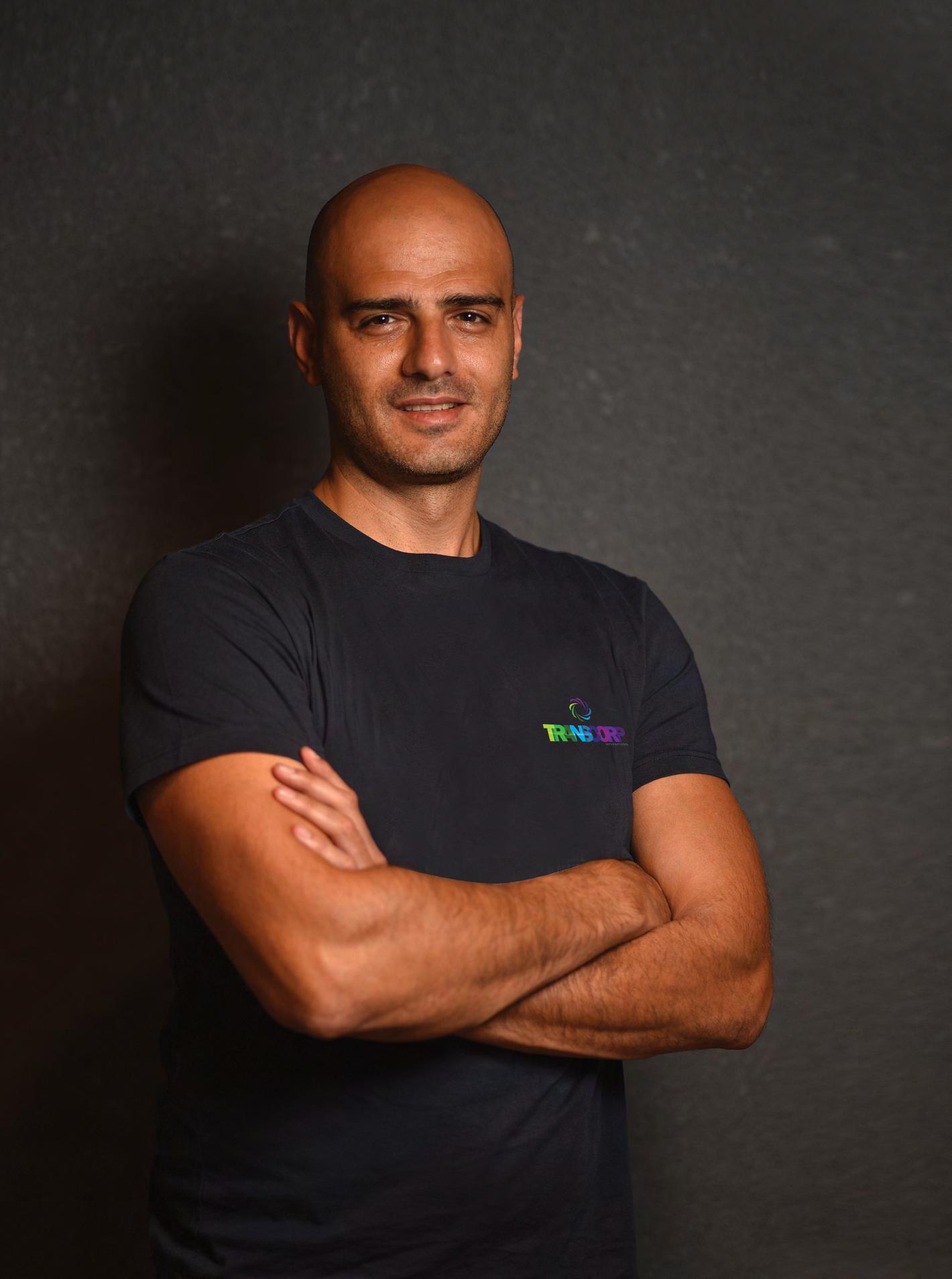






































Vibha Mehta, Editor of Logistics News ME, speaks with Rodrigue Nacouzi, CEO and Founder of Transcorp International about the company, regional logistics landscape, challenges faced by the company, and much more
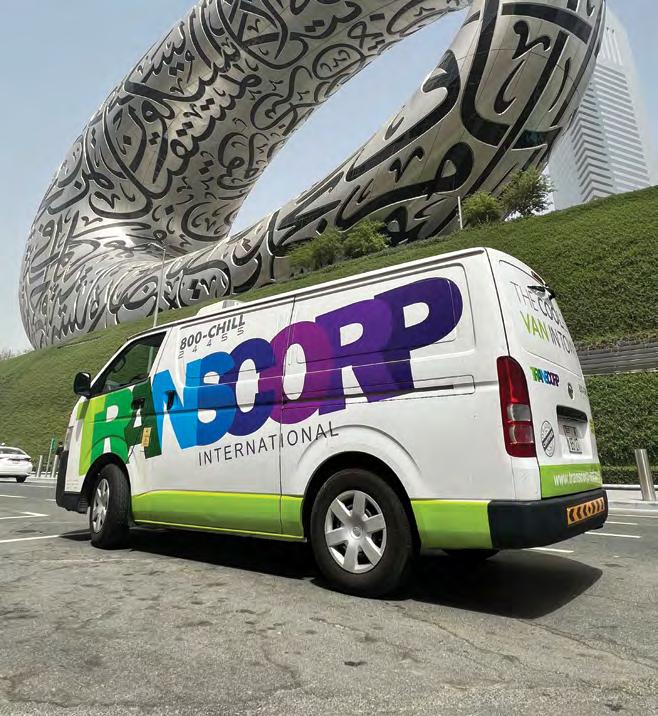




First things first: Happy 2023 to each and every one of our readers! As we begin this year, Logistics News ME will promise readers that they will read traditional articles from a variety of topics each month, joining me in making a few new year's resolutions.
To begin with, this month we bring forward our cover story hero (p.22), Rodrigue Nacouzi, CEO and Founder of Transcorp International, a self-made hero who is influencing the smart coldchain solutions in the region. “Being at the hub of the supply chain, we took this challenge to new levels and created new procedures, cutting-edge supply and demand strategies, and improved technology to address the issues with the
new timely deliveries,” says Rodrigue. While the story walks you through the logistical landscape in the region and the various challenges the industry is facing, Rodrigue has also shared some wise words for all the budding entrepreneurs to take the big jump.

According to Karl Crowther, Vice President of Alteryx, MEA sheds lights on how logistics can learn from air freight in 2023 (p.14), and collected, processed, comprehended, and used - is the essential component for innovations and decision making in 2023. Subsequently, our Logistics in F&B feature (p.32) complies valuable insights from Alwin Varghese, Cluster Purchasing Manager at Grand Millennium Dubai Barsha Heights, on how the supply chain and logistics operations are conducted for the hotel.
Jean Luc Graziato, Chief Commercial Officer at Majid Al Futtaim Retail (p.34), talks about Carrefour’s smooth supply chain operations to withstand its position in the market. Simon Mason, Chief Operating and Chief Revenue Officer of Writer Relocations (p.44), outlines the foundations of sustainability. Cheers to reading!
CEO Wissam Younane wissam@bncpublishing.net
DIRECTOR Rabih Najm rabih@bncpublishing.net
GROUP PUBLISHING DIRECTOR Joaquim D'Costa jo@bncpublishing.net +971 50 440 2706
MANAGING EDITOR Kasun Illankoon kasun@bncpublishing.net
EDITOR Vibha Mehta vibha@bncpublishing.net
EDITORIAL DESIGN Christian Harb
MARKETING EXECUTIVE Aaron Joshua Sinanbam aj@bncpublishing.net

PHOTOGRAPHER Alexander Bungas
subscriptions@bncpublishing.net
PO Box 502511 Dubai, United Arab Emirates P +971 4 4200 506 | F +971 4 4200 196
For all commercial enquiries, contact sales@bncpublishing.net T +971 50 440 2706
All rights reserved © 2022. Opinions expressed are solely those of the contributors.

Logistics News ME and all subsidiary publications in the MENA region are officially licensed exclusively to BNC Publishing in the MENA region by Logistics News ME. No part of this magazine may be reproduced or transmitted in any form or by any means without written permission of the publisher.
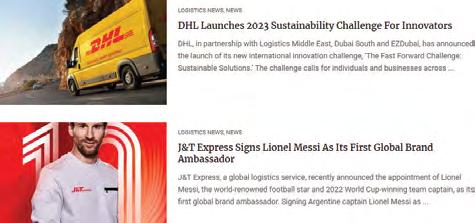
Images used in Logistics News ME are credited when necessary. Attributed use of copyrighted images with permission. All images not credited courtesy Shutterstock.
Printed by UPP











Admiral Mobility, one of the top energy management providers and accessible eMobility solutions, has committed to bringing 5000 commercial electric cars to the Middle East. The commitment includes 2000 Electric Farizon SuperVANs and 3000 Electric Commercial Trucks, which are divided between 6T and 8T.
The order is the outcome of a strategic alliance between Admiral Mobility and Geely Farizon Commercial Group, which was established in response to the rising need for environmentally friendly mobility on city streets, highways, and backroads to protect the environment for all of us. The UAE is
concentrating on fulfilling its Sustainable Development Goals (SDGs) to offer access to clean energy and promote sustainable economic growth. The pledge to import 500 commercial vehicles into the UAE in 2023 would aid in developing the ‘green transportation industry,’ particularly in the run-up to the COP28 climate change summit in 2019.
Admiral Mobility’s focus will be on providing businesses that distribute goods with the opportunity to do so sustainably with EV (electric vehicle) trucks, thereby providing an environmentally friendly and financially viable business model. Admiral Mobility supports governments, municipalities, and ‘mega-projects’ in its quest to ‘decarbonize’ the trans-
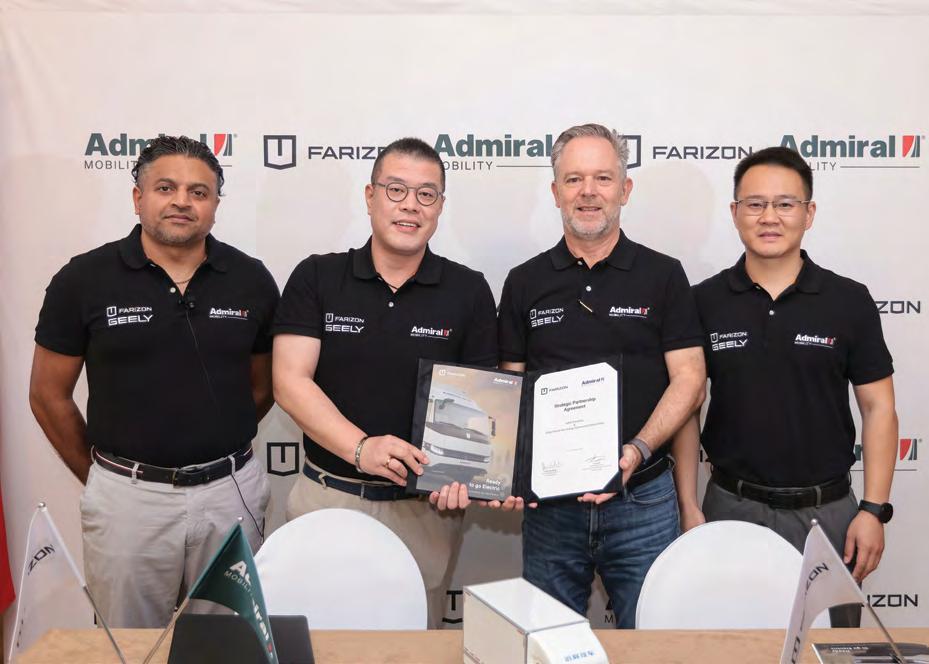
portation industry. Admiral Mobility will also give a variety of methods to serve both public and private sector enterprises by handling aftersales services, dealing with charging network needs and providing appealing lease model agreements to offer total flexibility and peace of mind.
Frank Bernthaler, Chief Operating Officer of Admiral Mobility, commented on the announcement: “With COP28 fast approaching and sustainability being high on everyone’s agendas, this partnership is an important step forward to build a robust EV truck portfolio in the region. As we transition towards more environmentally friendly energy and transportation solutions, we are proud to play a key role
in building an infrastructure that empowers the government’s electrification strategy. We look forward to supporting businesses as they move towards electric vehicles in the region.”
The zero-emissions electric Farizon SuperVAN travels up to 400 km safely and charges in less than two hours using its effective LFP battery. Advanced safety features include cruise control with lane-keeping assistance, remote locking systems, high-beam LED lights with automatic traffic adaptation, and, of course, ease of comfort while driving.
The UAE ranks seventh internationally in terms of being ready for electric mobility, with significant government measures planned to expand the number of electric cars on the roads as an alternative to ensure clean energy. The UAE wants to achieve carbon neutrality by 2050. The country’s electric vehicle (EV) industry is anticipated to expand at a CAGR of 30% between 2022 and 2028, according to the Global Electric Mobility Readiness Index - Gemrix 2022.
Mingshi Lin, Vice President of Geely Farizon New Energy Commercial Vehicle Group, adds, Developing and promoting new energy commercial vehicles is essential and urgent for creating a globally sustainable future. With Farizon’s advanced automotive technology enabled by our R&D capabilities, now aided by the extensive market reach and customer insights of Admiral Mobility, we are confident in bringing high-quality carbon-free commercial vehicles to the entire GCC region.

NEXT50, an Abu Dhabi-based technology company, is well underway in delivering the first phase of the biometric initiative at Abu Dhabi International Airport. The project, which sees NEXT50 introduce its cutting-edge A.I. solutions alongside global artificial intelligence and technology solutions partners IDEMIA and SITA, will initially see the deployment of next-generation biometric solutions at select self-service baggage touchpoints, immigration e-gates, and boarding gates before implementing the technology across all passenger touchpoints in the airport.
“We are excited to be leading the biometrics project at the UAE capital’s state-of-the-art International Airport as part of the Emirate’s digital transformation vision,” said Ibrahim Al Mannaee, NEXT50’S Chief Executive Officer. “Once the project is fully realized, the airport will be the only airport in the region with biometric solutions implemented across all customer touchpoints, contributing to Abu Dhabi Airport’s vision to become the operator of the most technologydriven airport in the world, providing a
seamless journey to all its passengers. We are proud to join forces with IDEMIA and SITA and offer our artificial intelligence and data sciences expertise to make this initiative a reality.”
H.E. Eng. Jamal Salem Al Dhaheri, MD and CEO of Abu Dhabi Airports, says, “The phase one deployment of advanced biometrics at Abu Dhabi International Airport further cements our commitment to shaping the future of airport experiences by delivering innovation and technology that drives efficiency, convenience and service excellence. Upon completing the project, Abu Dhabi will be home to the world’s first airport to include every touch point in the biometric journey, providing travellers with a seamless, safe and secure passenger experience.”
Once the project is delivered, it will offer passengers a convenient, simplified, contactless and hygienic experience from ‘curb-to-gate’. In addition, this will result in reduced wait times and less time queuing for passengers. The systems will use hi-tech biometric cameras to verify passenger details along several airport touchpoints, including the self-
service baggage drop, passport control, business class lounge, and boarding gates.
Hani El Assaad, President of Middle East & Africa, SITA, said: “We’re excited to collaborate with NEXT50 to implement cutting-edge biometric solutions in Abu Dhabi. The airport of the future will be driven by technology that enables safe, seamless, and easy travel every step of the way. This latest deployment showcases the power of Smart Path to deliver a fluid journey where a passenger’s face becomes their boarding pass, from check-in to boarding.
Osama Al Makharmeh, Executive Director, IDEMIA, UAE, commented on the biometrics project: “Our collaboration today with NEXT50 will see the latest in biometric technologies brought here to the UAE’s modern capital of Abu Dhabi. We admire the UAE’s technologically driven growth trajectory and are proud to participate in this incredible transformation and be part of the success story of Abu Dhabi International Airport. This partnership harnesses contactless biometric technology that gives users an unrivalled airport experience without letting up one jot on security. This bears out our capacity to constantly innovate to safeguard passenger trust and help pave the way for even smoother and more secure future travel”.
This past year, on 8th December 2022, Byrne Equipment Rental held a successful product open day at their depot in Oman, located just outside Muscat in Barka. Since its inception in 2009, the Oman branch of Byrne Equipment Rental has gone from strength to strength, from a small team of 5 to a skilled team of 40, with two depot locations, and an extensive fleet of over 600 items of equipment, with the ability to extend this via their Byrne network which has a fleet of over 14,000 items of equipment, located in 20 operational depots and offices spread across the GCC in KSA, Kuwait, UAE, Oman and Bahrain.
The Oman economy has always been largely dependent on the O&G sector. However, under ‘Oman’s Vision 2040′ program, the government is focusing on diversification to stimulate economic growth – with various ongoing projects encompassing multiple industries, including manufacturing, tourism, logistics, energy, and mining sectors.
Mick Tipp, General Manager of Byrne Oman, says, “The level of projected development in Oman is fantastic for the economy as well as Byrne Equipment Rental’s operations, and the business is well positioned to meet the requirements for equipment rental across all these industries.”
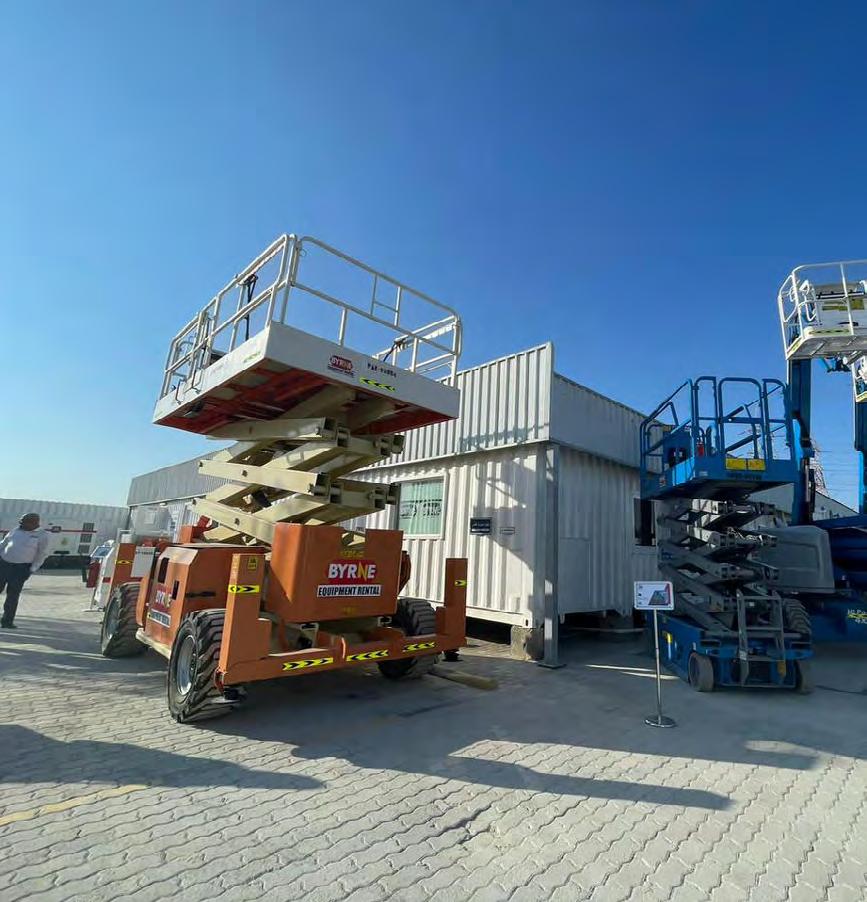
“We have been in Oman for 12 years, and the decision to hold an open day has been a long time coming and was taken to liaise with our clients, both existing and prospective, and show that we have a vast range of equipment that people may not be aware of and be able to use in the future, for projects across various industries.”
On the day itself, doors opened at 9 am and invited clients to come along and view a range of selected equipment that was on display, including ablutions, boom lifts, scissor lifts, diesel, and power generators, as well as hoist and mast climbers which were set up for interactive demonstrations. The Oman team had also prepared several temporary buildings in various configurations that were furnished and set up to demonstrate their capabilities, including ensuite junior and VIP accommodation, office facilities, a mess and dining hall, prayer rooms and more.
Mick continues, “The open day was a first for the Byrne Oman location, and it exceeded our expectations – we had a great turnout, and it was a pleasure to welcome all that attended. We were able to connect with our clients, both existing and new, and demonstrate our business capabilities as a single-source solution provider that can cater to a vast range of industries, including but not limited to O&G, construction and infrastructure, events, manufacturing, and logistics, marine and ports, retail and commercial and defence and military.
Most of our business in Oman comes from the shutdown and turnaround industry, as we can supply camps and support any shutdown needs, whether accommodation, ablutions, and other supporting equipment. However, this open day proved a fantastic opportunity to demonstrate what we can offer other industries as a turnkey solutions provider and show our versatility and adaptability. We are the single source solution for equipment rental; this was an excellent opportunity to demonstrate this. In the future, we intend to hold these open days regularly and look forward to the next one in April 2023!”
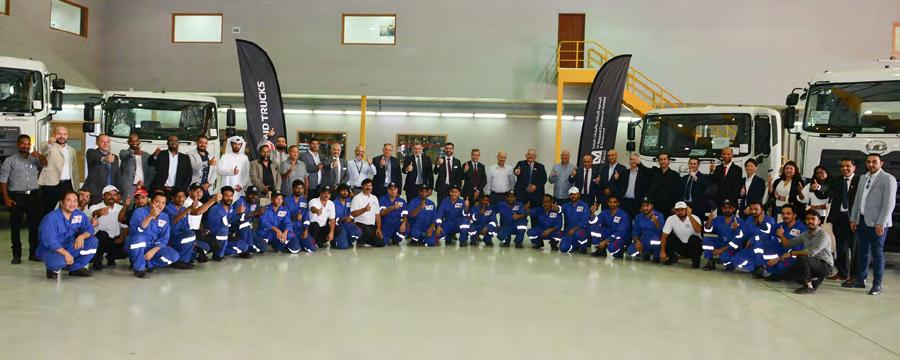
Senior officials from UD Trucks and Al Masaood met before the opening of a new plant in Mussafah, Abu Dhabi, which is planned to open shortly to accommodate the expanding client base of the Japanese truck manufacturer. This brand-new, cutting-edge servicing facility will assist UD Trucks in meeting increasing demand while maintaining high quality and customer satisfaction standards.
Jacques Michel, senior vice president of UD Trucks, Mourad Hedna, and Hani Tannir, CEO of Group Industrial at Al Masaood, met with clients to discuss the brand’s long-term strategy and direction as well as its future within the Isuzu Motors Group. At the occasion, clients from all across the emirate attended, giving them a chance to tour the new facility and learn more about its advantages.
With service space for 30 vehicles and 12 body repairs, this new facility will quadruple the brand’s servicing capacity compared to its prior location. The number of technicians has also grown significantly, from 21 to 39.
Mourad Hedna, UD Trucks Middle East, East & North Africa President, says, “At UD Trucks, we strive to provide uncompromising service support, which means adhering to efficient and clear standards. The unwavering premium service that we aim to deliver needs to be complemented by having the right instruments to execute our approach. We firmly believe that our long-standing
partner, Al Masaood, will serve our customers in their newly established location with unmatched tenacity, providing excellent aftersales services and ensuring our promise, To Go the Extra Mile.”
The new workshop, which is focused on offering and delivering the best aftersales support and customer services, reflects the commitment of both UD Trucks and Al Masaood to positively contribute to the communities of Abu Dhabi and Al Ain in line with the

Abu Dhabi 2030 Vision, which aims to create a robust and sufficient infrastructure that can support economic growth in the coming years.
The workshop is expected to strengthen UD Trucks’ market position by offering sustainable aftersales services, while Al Masaood will continue to provide clients of UD Trucks with the best calibre support on a larger scale. The expanded workspace will also include substantial components warehouse, reducing turnaround times.
Mohammed El Zeftawi, General Manager of Al Masaood Commercial Vehicles and Equipment, adds, “Al Masaood CV&E Division and UD Trucks have enjoyed
a long-lasting relationship that is built on a shared vision of offering customers sustainable end-to-end sales and aftersales services. Our much-anticipated M40 facility will help us achieve our common objectives and further strengthen our relationship. Besides offering excellent after-sales services on a larger scale, the new workshop also has a sizable parts warehouse, which will greatly reduce the turnaround time, further enhancing the overall customer experience. We look forward to continuing to build our partnership with UD Trucks, which was established in 1981, as part of our commitment to consistently improving our customers’ experience in the region.”
This sector will continue to experience an increasing amount of disruption over the next five years. Forward-looking players can ride this wave successfully, given that they act now. Public transport organizations should take the time to pause, reflect and map out a new future of enhanced customer experiences and integrated services, along with decarbonized and digitalized operations, while securing stable finances.
KPMG International, in a commissioned survey conducted by Forrester Consulting, engaged 483
leaders from public transportation organizations across the globe to understand their perspectives on the sector’s future. Participants included public transport ministries and authorities, operators and outsourced vendors.
In this report, we explore the potential that a connected public transport enterprise has in forging robust enterprise-wide business and delivery models that can drive excellent customer experience while enhancing efficiency and contributing to the prosperous future we all want to see.
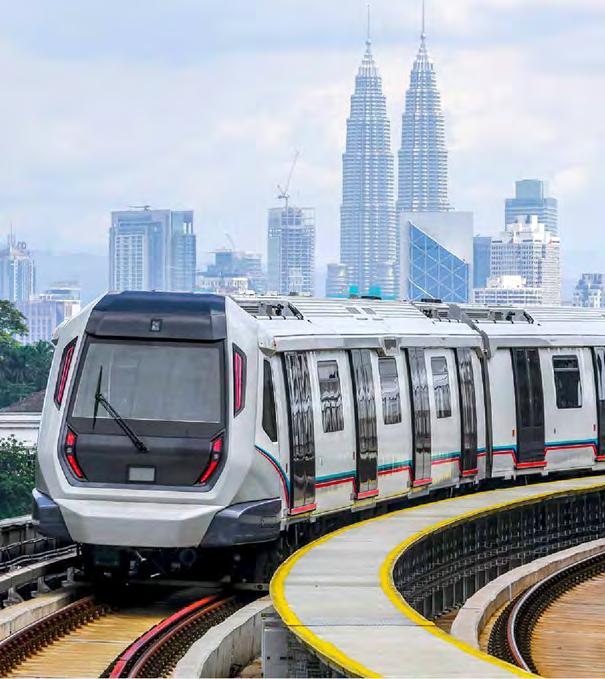
The report documents current industry trends, presents compelling hypotheses on the sector’s future and charts the way forward to support this journey.
Public transport has traditionally been provided by heavily subsidized publicsector bodies operating discrete/siloed transportation modes. This approach made sense from an asset-management perspective, but it led to journey options for citizens when timetables, ticketing and customer service were not always aligned to expedite travel across various transit systems. Additionally, agencies typically took a monopoly mindset to protect revenue and market share.
New market entrants are changing the last-mile equation through enhanced services and convenient new offerings. Additonally, disruptive transport technologies are on the horizon. Frictionless service interactions in other sectors have raised customer expectations of public transport. Joined-up services, seamless payments and enhanced customer experiences are the way forward for mature transport systems.
Priorities are shifting as decisionmakers listen to the voice of their constituents and look beyond the operation of transport infrastructure, fleets and workforce to fully consider the advantages of a connected, 21st-century ecosystem. The signals of change are powerful and unmistakable.
Firstly, evolving customer and community expectations for connected, personalized services will require organizations to be even more responsive. Secondly, public transport can be a crucial enabler of sustainable economic growth and equitable access to opportunity. New public transport modes, entrants and enabling technologies such as autonomous vehicles, air taxis and hyperloops are poised to change how services are delivered. Additionally, Mobility-as-aService and autonomous vehicles have the potential to be cost-competitive with public transport services and more convenient in servicing the last mile of customer journeys. Lastly, the pace of
PRIORITIES ARE SHIFTING AS DECISION-MAKERS LISTEN TO THE VOICE OF THEIR CONSTITUENTS AND LOOK BEYOND THE OPERATION OF TRANSPORT INFRASTRUCTURE.
innovation is accelerating and exceeding the rate at which regulatory systems can adapt. Regulation will need to be dynamic amidst ongoing innovation.
In addition to these signals, the profound impact of the global pandemic has reshaped workforces, lifestyles and reliance on public transportation systems. Demand for services may evolve as many citizens embrace hybrid work models or replace urban lifestyles with more-affordable suburban settings. But KPMG believes that vibrant cities will remain relevant and prosper, and transport systems will evolve to serve citizens, drive equity and meet net-zero targets.
Public transport agencies must become more innovative and more agile. They should focus on the essential core of public transport operations to evolve networks, service patterns, fare policy, investment strategy and asset custodianship. In their role as market stewards, agencies should direct modern ecosystems in partnership with the private sector to meet cost pressures, public expectations and environmental goals. Agencies should position themselves to meet these challenges by: Considering if their operating model enables multi-modal planning; redefining their role as commissioner of markets within new regulatory frameworks; deploying policy and behavioural change initiatives to meet net-zero
targets; implementing new funding models and revenue sources to help ensure financial sustainability; and, understanding how planned investments can drive social and economic opportunity.
As change unfolds and the pace of change accelerates, we present seven thoughtprovoking predictions on the future of public transport:
1. The political influence over public transport is expected to grow as it is increasingly seen as a lever to drive social and economic opportunity.
2. The agencies will likely become the commissioner of markets rather than the deliverer of services. The future transport algorithms will likely nudge customers through the network, balancing individual preferences with network and social requirements.
3. Decarbonization of transport operations will likely become a strategic business priority.
Public transport is expected to be accessible for some citizens and communities and funded in innovative new ways. Agencies will also likely require more in-

house technology and digital transformation. Automation will likely result in a reskilled and redeployed workforce. Lastly, outcome and riskbased regulation are expected to be needed to embed flexibility.
Electrified network to help meet net-zero targets: Aiming to reduce air and noise pollution with ubiquitous electric vehicles (EVs) can create healthier communities.
Mobility-as-a-Service (MaaS) solutions: Single customer interface to enable easy-to-understand journeys in a broad market of transport services
Algorithms nudge customer choices: Movements can be dictated according to network needs and user preferences.
On-demand services: Localized services responding to customer needs — a transition from the traditional hub and spoke model to pointto-point services.
Autonomous services: Enabled by the Internet of Things, smart technologies and 5G connectivity

Integration of new and emerging modes: Last-mile offerings, hyperloops, e-helicopters, autonomous vehicles.
Outcome and risk-based regulation: To facilitate more outstanding market entry for new and emerging modes. The creation of innovative partnerships will likely drive the delivery of seamless services.
Predictability, reliability, and consistency are three sacred hallmarks of logistics and supply chain success. If deliveries don’t get where they need to go on time, each time, every time, then the trust process breaks down, and the promise of on-time freight delivery goes down with it.
The double-edged sword of disruption cuts both during and after the event. With the reduced supply of a product available but consistent demand, stores will rapidly sell out, and end-customer purchasing behaviour will adjust. We saw this during COVID-19 when shoppers panic-bought essentials – pushing artificial shortages. Despite eminently manageable supply
chain issues, the perception of reduced supply drove demand through the roof and caused even more chaos.
The difference between organisations that have thrived – versus just survived – amidst this disruption comes down to those who have – and have not – effectively used data to make decisions. Nowhere is this trend seen as significantly as in the air freight industry, and with an adequate understanding of customer needs and changing external signals, supply chain managers can use real-time insights to inform decisions quickly. By delivering insights on demand forecasting, material availability, inventory levels, and SKU rationalisations, successful businesses were able to combat market disruption at pace.
Large-scale disruption continues to be seen across all industries today. The air freight industry faces similar challenges. While far-reaching and impactful, disruption can also be contextually simple to identify and mitigate with the correct data.

Karl
Vice President of Alteryx, MEA
Historically, without the insights to assess macro demand or identify interruptions in advance, supply chain specialists could not make fast decisions to mitigate that disruption. In an era defined by uncertainty and upheaval, this lack of business intelligence is no longer a feasible strategy.
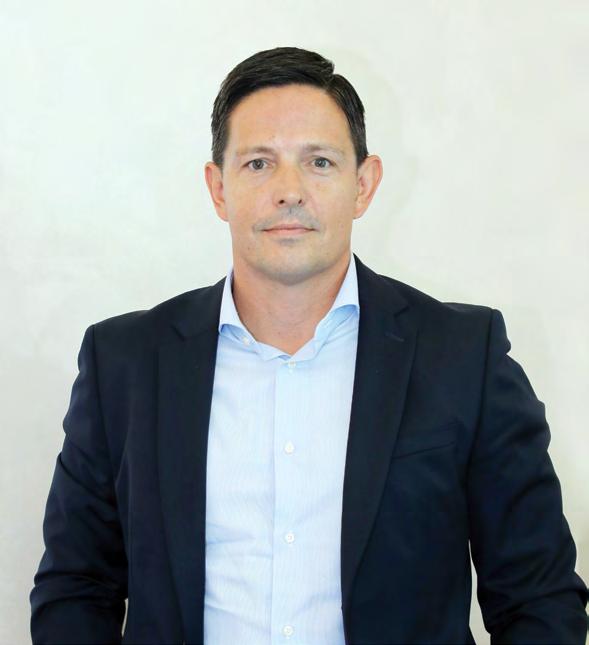
Leaders who once made decisions based on gut instinct and pattern recognition alone are now finding entirely new patterns – ones that are wholly different from those they have experienced.
Alteryx-commissioned IDC research highlighted that 71% of global businesses believe ‘the business landscape is changing faster than ever.’

For the UAE specifically, it
highlighted a huge demand for faster insights – fuelled by data and AI analytics – to overcome that industry disruption and fully harness decision intelligence for business benefit.
Dubai International Airport, for example, completely reimagined its passenger demand forecasting using analytics. They delivered 40% improvements in passenger wait times over two years. They combined camera and sensor data in their Airport Operations Control centre, collating it against live flight arrival times, to give them the minute-by-minute decision intelligence they needed to deliver on their business goals.
Air freight is traditionally used for urgent items like medicine or perishables that would not last on a long sea voyage. Due to the high-value items transported and the importance of them being delivered on time, air freight developed a well-earned reputation for success - delivering on time, each time, every time. With requirements for predictability, reliability, and consistency, alongside those tight delivery timeframes, the aviation sector has – by necessity – transformed into an innovation crucible.
The key ingredient behind these innovations is data – collected, transformed, understood, and utilised for decisions across the business landscape.
Accessible data, upskilled teams, and easy-to-use analytic technology are all key to the aviation sector’s success - as is an overarching business imperative to do more with
less. There are core lessons for supply chain specialists to learn here. Analytical adoption like this is essential to fast and predictable cargo delivery as and when needed.
In many cases, the missing ingredient is a lack of human talent. Our IDC research shows that 82% of UAE businesses do not closely match their technology investment with the human upskilling and training required to take advantage of that technology.
Data democratisation and analytics upskilling are the
core ingredients needed to solve this challenge – giving the workers closest to the problem the tools they need to solve it themselves. After all, if you’re lost and looking for directions, you’ll ask the delivery driver, not the data science team.
Just as every cloud has a silver lining, so to does every challenge come with the opportunity for change. This utilisation of data and analytics insights in the air freight sector is a case study for wider analytic adoption in the UAE logistics space.

Compared to a city with a horizontal infrastructure, this proves far more effective and supports the government’s efforts to work toward a collective goal of sustainability.
Dubai’s polycentric city approach further supports this. A polycentric city is an area with three or more clusters of buildings that are significantly taller than the surrounding urban fabric. Skyscraper districts and clustered communities such as Downtown Dubai, JLT; Business Bay; Dubai Marina; Palm Jumeirah; and several others today cover a significant portion of the city’s infrastructure and contribute to reducing travel time to execute deliveries in these clusters. So while the volume of deliveries within these areas will be higher, a comparatively shorter delivery radius will also make implementing smart mobility concepts, such as driverless shuttles, e-bikes, and so on, possible. But are these factors alone enough to tackle the logistical challenges in the country?

Soham Chokshi, CEO & CoFounder of Shipsy, shares his opinions on various resources enabling sustainable logistics. From UAE’s worldclass infrastructure comprising green skyscrapers to the adoption of cutting-edge technologies to digitize processes and launch smart mobility resources, UAE has established itself as one of the frontrunners in the sustainability game —in alignment with Dubai Vision 2030. But how exactly can UAE’s vertical urbanization influence sustainable logistics operations?
High-rise residential buildings in Dubai reached 581,166 units (79%) in 2020 and are a common residential type. This number continues to increase as the city expands its real estate horizons. Since these tall residential towers house numerous people, the chances of receiving multiple orders from one particular tower are higher. This reduces the time the delivery agents spend on the road to deliver an order. It also shrinks trip volumes and distance travelled and reduces carbon emissions to fulfil delivery commitments.
61% of transportation and logistics organizations globally consider the last mile as the costliest leg of the entire logistics operation. Moreover, challenges such as poor address quality are unique to the region, eventually adding up to fuel consumption and a brand’s carbon footprint. Beyond such logistics inefficiencies lay the ever-evolving customer demands around faster, economical, and sustainable deliveries.
Delivery is a critical component of a customer’s online purchasing experience. For instance, 64% of customers want to know the ETA of their orders, 28% consider delivery time to determine how good a retailer is, while 61% will continue to shop with the brand if they are happy with the delivery experience. As a result, delivery services have become critical in establishing a competitive edge in the eCommerce and retail industries.
Many companies offer same-day delivery services to consumers looking for easier and faster delivery options. This has resulted in delivery partners increasing the volume of vehicles on
road, and trip frequencies to meet same-day delivery SLAs, thereby shooting up the carbon footprint.
Additionally, a surge in fuel prices is a significant cause of worry as it considerably swells overall logistics costs. Businesses need to shell out more money for each mile travelled which directly hits profitability. Please address this challenge to avoid passing the cost-burden baton to the consumer, which can be detrimental to customer retention. Moreover, 65% of consumers in the Middle East have become more ecofriendly during the pandemic, engaging in sustainable behaviours. It will not be surprising to see customers buying into brands that focus on sustainability.
To tackle evolving customer expectations and such unprecedented variables, businesses must invest in innovative and agile technologies. Such solutions can improve process efficiencies, reduce costs, and drive sustainable logistics operations.
Executing Sustainable Logistics Operations
Here’s how joining forces with intelligent logistics management tools can further support actualizing sustainable logistics operations in the UAE.
Smart logistics management platform digitizes the product journey. It allows businesses to tame areas of

logistical inefficiencies. Digital documentation removes paper trails. AI and MLpowered route planning and optimization engines chalk the plan for the most efficient travel route across logistics operations. This results in lesser time spent on the road. Intelligent route optimizers help eliminate empty miles, reduce the distance travelled by 5%, prevent vehicle idling, and shrink trip volumes by 6%.
Accurate ETAs, real-time tracking of delivery progress, and flexible deliveries enable customers to stay available at the time of delivery or request a reschedule as per their preferred time slots. This helps logistics stakeholders to maximize the first-attempt delivery success rate and reduce multiple reattempts, trip volumes, and CO2 emissions.
Such solutions also empower delivery managers to configure and prioritize eco-friendly delivery modes for a select, often short, delivery radius, which is particularly favourable given Dubai’s polycentric city model. With this pre-fed logic, the system automatically allocates bicycles, EVs, or driverless vehicles to execute shortdistance deliveries.
Poor quality addresses or drivers’ inability to navigate to the customer location on time is a big concern for express parcel delivery service providers. This leads to more fuel consumption and CO2 emissions. Moreover, 51% of shoppers go for returns if their order arrives late, which puts all the logistical efforts to waste.
Geocoding helps convert poorquality addresses into exact coordinates. This shows up as a clear polyline on the driver’s mobile app leading them to the exact customer location.
Another method to enhance delivery performance is automating capacity planning. AI-powered logistics management tools leverage intelligent algorithms that seamlessly map consignment and vehicle data. They can optimize a vehicle’s capacity by considering parameters such as delivery location, weight, volume, time SLAs, storage type, and much more, which helps improve fleet capacity without hampering mileage or vehicle life as it runs on optimum load. It thereby increases vehicle capacity utilization by 31%.
AI-powered logistics management platforms improve delivery productivity by enabling multi-stop pickups and deliveries for drivers on a single trip. En-route order clubbing combines pickups and drops to reduce trip frequencies and improve driver productivity by 14%.
The right mix of infrastructure and technology can significantly drive green logistics operations and support the UAE’s sustainability goals, one delivery at a time.
Geocoding helps convert poor-quality addresses into exact coordinates. This shows up as a clear polyline on the driver’s mobile app leading them to the exact customer location.
Rawan has an academic background in physics and experience in experimental environments and works in the automation sector. While he has a keen interest in micro-fulfilment, rapid delivery and last-mile logistics, he is also helping expand Interact Analysis’ research coverage in this fastgrowing industry.
Following the publication of our Warehouse Automation – 2022 report, we have produced this insight to discuss the major themes which have influenced the forecast. The report provides a highly granular assessment of the market and factors in many nuances. This insight, therefore, intends to provide a top-level summary of the key trends.
The warehouse automation market grew by a phenomenal 28% in 2021, with revenues reaching $36 billion, up from $28.5 billion in 2020. The growth of automation revenues in 2021 was driven mainly by the e-commerce spike caused by the pandemic. According to FRED, US E-commerce penetration peaked at 16.4% in 2020, rising from 10% in Q1 2019. To service this increase in e-commerce demand, we saw several retailers bolstering their fulfilment capacity. For example, according to its annual reports, Amazon’s total warehouse square footage ballooned from 272 million at the end of 2019 to 525 million at the end of 2021.

Because automation is often used in fulfilment centres due to the complexity of the operation, we saw warehouse automation investments spike during the pandemic as retailers rapidly expanded their fulfilment capacity. Amazon led the charge in automation investments, accounting for more than 30% of total automation investments in the US in 2021.

The pandemic also significantly impacted commodity prices, which skyrocketed in 2020. Steel prices, for example, had more than tripled by the end of 2021 compared to pre-pandemic levels, while the cost of electronic components also increased significantly due to supply-chain constraints and poor demand forecasting. The cost of steel can make up to 80% of the value of some automated systems like unit-load AS/RS, which meant that automation increased significantly during the pandemic.
Lastly, the early lockdowns resulted in many companies having artificially low revenues in 2020 as project completion dates were pushed back into 2021. Knapp, for example, suffered a -1.8% decrease in revenues in 2020, despite a 55% increase in order intake. This revenue ‘push-back’ led to somewhat artificially high gains in 2021, and we expect completion timing will recalibrate by 2023.
Since its peak of 16.4%, US e-commerce penetration dropped slightly in 2021. This was mainly due to a shift back to brickand-mortar retail which is going through a renaissance. This caught many retailers off-guard as they expected the pandemic would permanently change buying habits. In response to the slowdown in e-commerce sales, many e-commerce retailers announced a pullback in their fulfilment network expansions.
For example, Amazon announced it would slow down its fulfilment expansion after posting a loss in Q1 2022. This will significantly impact its warehouse automation investments, which we expect will be cut by 30% in 2022 and a further 15% reduction in 2023. Ocado also announced it would reduce its expansion plans as it ponders how it will fully utilize its new facilities in Bicester and Luton in England.
Since Amazon accounted for more than 30% of total US warehouse automation investments in 2021, this will significantly impact the overall warehouse automation market. Furthermore, the automation vendors most exposed to Amazon will likely be looking elsewhere for projects that may erode margins as competition heats up.
In addition to the slowdown in e-commerce sales growth, there have also been several other geopolitical and economic factors that have affected the market. For example, the RussiaUkraine war has led to a rise in economic uncertainty in Europe. Coupled with soaring energy prices, some retailers and manufacturers are postponing significant capital investments, according to our research interviews.
Furthermore, we’ve also seen many central banks raise interest rates to tackle high inflation. This will increase the cost of capital and may result in companies considering postponing investments in automation financed using debt. Highinterest rates, inflation and low consumer confidence, will also slow retail growth and reduce appetite for warehouse automation.
Long-term, however, we expect a return to steady growth. Between 2024 and 2027, we forecast revenues to grow at a CAGR of 19%, driven by improving macroeconomic conditions. From 2024 onwards, we expect e-commerce growth to increase as the geopolitical and economic environment strengthens. Furthermore, as economic conditions improve, we expect a renewed focus on

shorter delivery windows from consumers, which haven’t been a top priority in recent months due to the cost-of-living crisis in many countries.
Our latest Warehouse Building Stock Database shows that just 18% of warehouses have some form of physical automation, which is expected to grow to 26% by 2027. With such a significant opportunity, short-term challenges shouldn’t take away from this market’s long-term growth potential.
Acloud-based SaaS field management tool for communication and documentation in building and real estate projects, PlanRadar is independent of platforms and gear. Maintenance, building inspections, construction documentation, handovers, fault and task management, and other uses are all possible. Teams may interact, exchange digital floor plans or BIM models, and track information using web applications for all smartphones and tablets (iOS, Android, and Windows).
Additionally, PlanRadar’s digitization of workflows lowers the frequency of errors, frees up time for everyone involved, and allows for substantial productivity improvements. Customers report saving up to 7 working hours each week. The firm, which has its headquarters in Vienna, Austria, currently gives more than 20,000 clients in more than 65

countries the ability to track, connect, and resolve issues on all global construction and real estate projects.
The Co-Founder, Group Co-CEO, and CEO for MENA & APAC at PlanRadar, Ibrahim Imam, explains his thoughts on how the logistics sector may benefit from this application.
Logistic centres and warehouses play a critical role for businesses, regardless of size or industry. These facilities must be managed and maintained to optimal levels, ensuring goods are stored safely and transported efficiently.
With facility management and maintenance being an integral component to the success of logistics companies, PlanRadar provides its clients with the tools they need to ensure their facilities run smoothly and prevent costly repairs down the line, thus reducing production costs and enabling companies to compete in the global market.
Facilities management teams may manage warehouses and logistics centres more effectively using PlanRadar. Facilities managers can plan, organize, document, and track activities in one location with simple task creation, automatic reporting, and realtime updates.
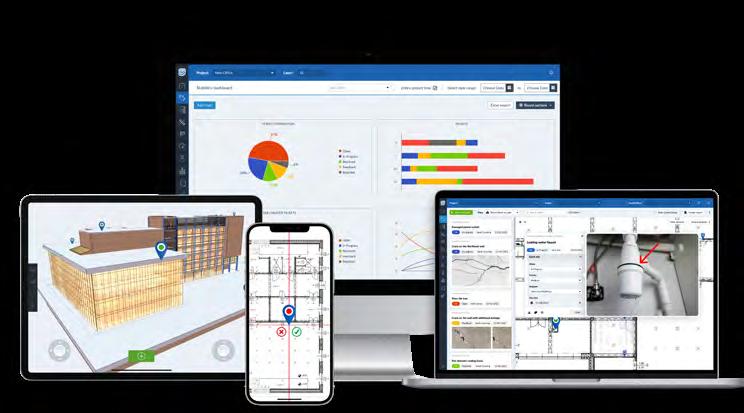
They can immediately obtain current information on their facilities and equipment to ensure they are always ready to go with the aid of PlanRadar, which assists them in scheduling maintenance, maintaining records, and monitoring the performance of warehouses.
The cloud-based platform from PlanRadar enables facilities management teams to view all project data from any location, enhancing collaboration and streamlining communication inside their facility. All of this guarantee improved long-term upkeep of logistical centres and warehousing facilities.
To protect their workers, infrastructure, and inventory from fire, logistic centres and warehouses must adhere to the strictest fire safety regulations. During fire risk assessments, PlanRadar makes gathering data simpler and identifying possible fire dangers before they become significant problems.
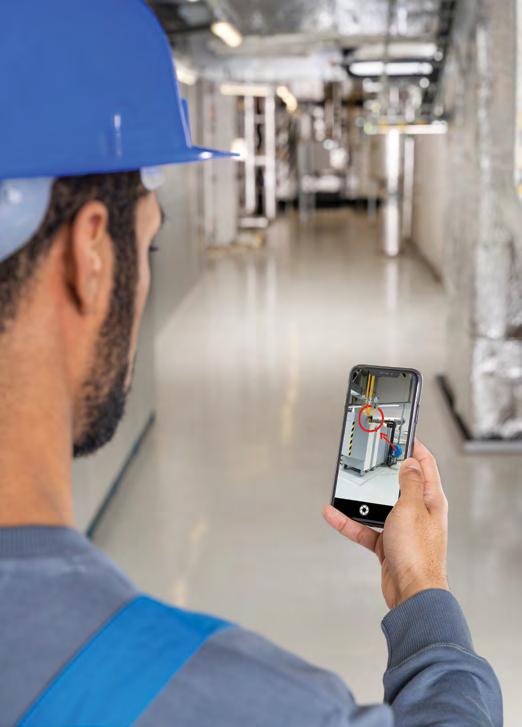
Users can easily access all required papers in one location thanks to customized forms, checklists, templates, and secure storage options, ensuring that crucial information is always available when needed.
Additionally, PlanRadar offers thorough reports on fire safety evaluations so that logistic clients can effectively maintain track of fire safety evaluation records and follow changes over time. This assists logistics clients in adhering to regional laws and ensuring everyone’s safety.
PLANRADAR
Clients may use PlanRadar’s support for QR codes and NFC tags to guarantee ongoing maintenance of warehouses and logistics centres and fire safety. The different teams may rapidly access and manage necessary information or given tasks by posting these tags throughout the site and scanning them with a smart device’s camera or the PlanRadar app.
This enables teams to increase cooperation, track the position of their assets and equipment, and provide everyone on-site with an easy method to access vital safety information.
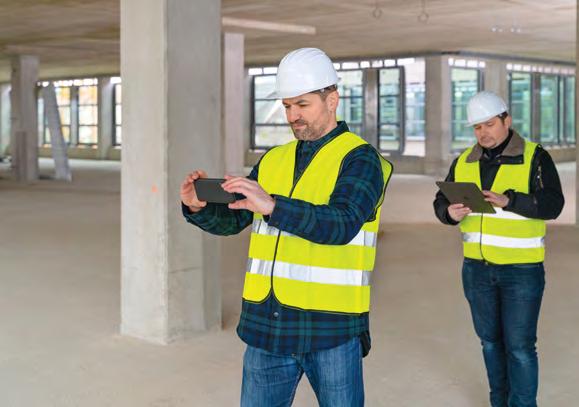
PlanRadar task management using QR codes or NFC tags is a great approach to increase communication and free up time for additional chores.
In conclusion, PlanRadar is an effective digital task management tool created to support users in achieving better results through enhanced communication, collaboration, and reporting. By offering processes, automatic reporting, and integrated chat dialogues that can be customized to meet any project or industry, it simply adjusts to the user’s unique demands.
“Logistic centres and warehouses play a critical role for businesses, regardless of size or industry. These facilities must be managed and maintained to optimal levels, ensuring goods are stored safely and transported efficiently.”
Transcorp Intl, a Logi-Tech firm headquartered in Dubai since 2013, serves the markets in the UAE and KSA. The business adopts a B2B2C business model that addresses the omnichannel difficulties of the logistics sector’s temperature controlled ‘First, Middle, and Last Mile services.’
Additionally, the company is known for its distinctive temperature-controlled last-mile delivery programmes supported by cutting-edge technology that gives its end-users the most visibility and flexibility. By reducing waiting times, expanding delivery windows to four per day, and attaining an average success percentage of 98.2% for guaranteed next-day deliveries, Transcorp has been on a mission to disrupt and change the delivery standards for the last-mile services in every location it operates in. Transcorp also provides a specific same-day delivery option in addition to its usual services, which is popular and necessary for millennials.
With 16 warehouses dispersed around the region, Transcorp boasts one of the largest fleets of temperature-controlled “Coolest Van in Town” vans. Transcorp’s activities are supported by the largest food and beverage fulfilment centre in the region, which has a storage capacity of 40,000 bins and can handle +100,000 SKUs (stock keeping units). Likewise, its main fulfilment centre in Dubai has a daily capacity of 15,000 orders, but during the peak month of November, this capacity rises to 25,000 orders.

Beyond its core services, Transcorp covers the whole spectrum for online businesses, assisting such enterprises in navigating the complex logistical landscape. Correspondingly, Transcorp’s cuttingedge technology offers a wide range of advanced logistics services, from high visibility to interconnectivity and controlling returns, to satisfy the complex logistical needs of its different customers.
TRANSCORP INTL’S UNIQUE OFFERINGS
Among Transcorp’s exclusive offers are: 5 daily delivery windows (instead of the industry standard of 2); 7 days a week, 16 hours a day; 98% of deliveries are successful; 3 delivery options, including next-day, same-day, and express delivery services; and live data sharing with API/ Plugin integrations. Transcorp complies fully with all business regulations and company policies as well as with global standards for corporate governance. Having said that, Transcorp International consistently leads the industry with exceptional compliance and speed, one of the key factors contributing to its success. Transcorp Intl believes in combining resources to generate mutual interests. “We operate in a fast business environment where companies need to evolve and develop new products and services constantly,” says Rodrigue Nacouzi, CEO and Founder of Transcorp International. Thus, the team at Transcorp are constantly developing their strategic alliances – be it aggregating unused resources and speeding up the development of new services or streamlining market
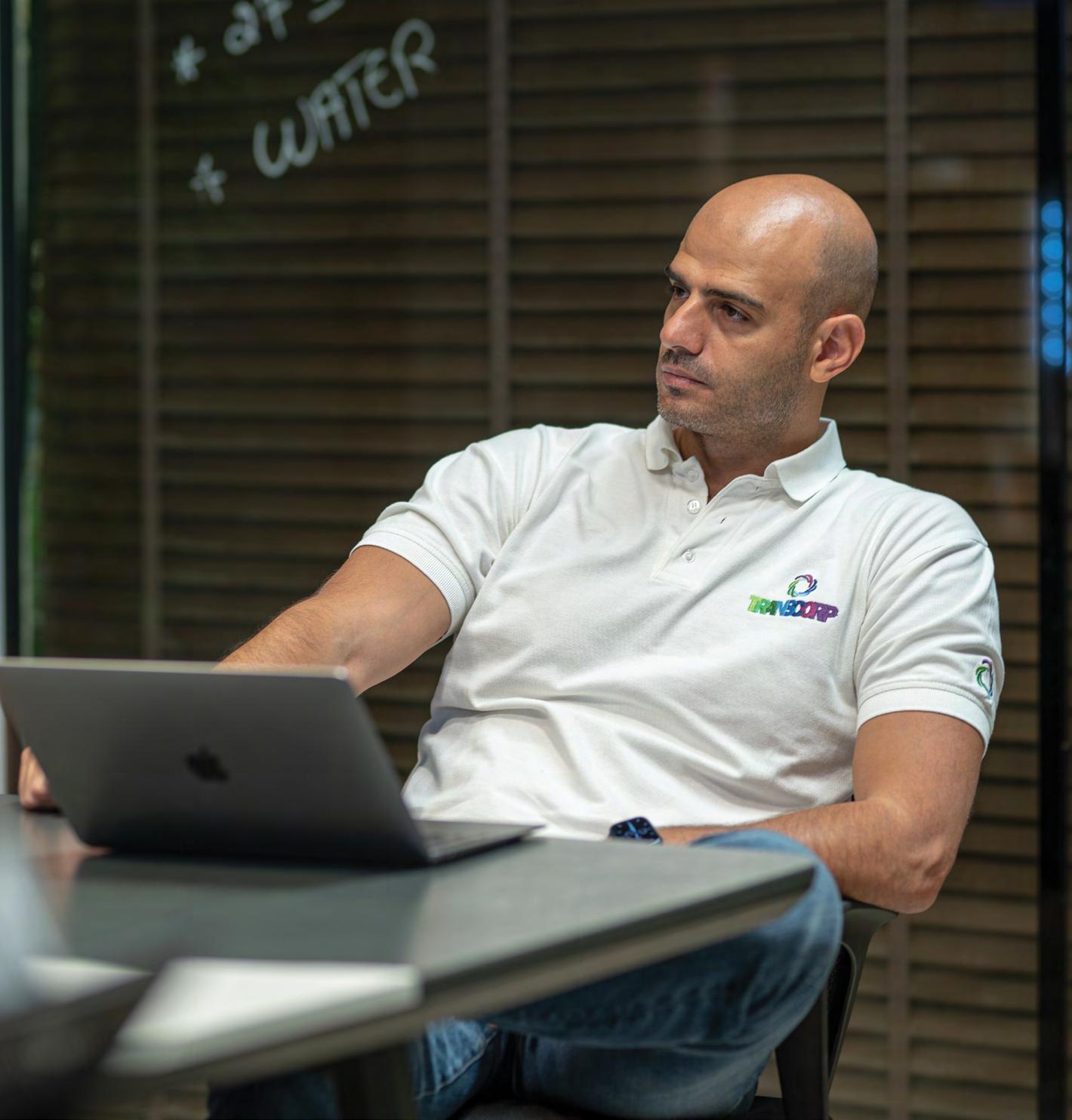
penetration costs and reducing unnecessary competition. Rodrigue believes that nothing is more illuminating and fruitful than a solid ecosystem – because of that, strong strategic alliances have helped Transcorp forge strong partnerships and a community-like environment in their discipline. “We are proud to have spearheaded this initiative since it has proven to all parties how beneficial it is to create synergies,” adds Rodrigue.
Whereas, for their KSA operations, Transcorp partnered with local distributors with excess and unutilised capacity
(in their warehouses and fleet). A hybrid aggregation model that enables the company to create a short supply chain when an urgent demand is required.
“The results were brilliant and helped our company to moderate its investment on CAPEX (while we plug & play) and generated sizable income from an unused capacity for our local partners,” said Rodrigue. Moreover, the above steps are completed through a user-friendly interface that saves time and money and eliminates the troublesome process of a traditional distributor. Rodrigue continued by saying that the firm has had +220% growth, thanks to their improved methods over the last four years. This attests to the accomplishment of the vision, objectives, and strategic partnerships that Transcorp has effectively designed, executed, and sustained.
The country’s or region’s overall supply chain and logistics environment provide excellent visibility into the region’s unique environment, how it functions, and what the prospects are. In 2025, the MENA region’s temp-controlled e-commerce industry is expected to reach $6 billion, with Egypt, Saudi Arabia, and the United
Arab Emirates accounting for 87% of the sector’s revenue. “We have observed a change in consumer behaviour towards e-commerce purchasing during the post-COVID era, which strengthened the first and last mile sectors.” According to analysis, e-commerce will increase rapidly between 2020 and 2022, with a CAGR of 20%, and then gradually until 2025, at a CAGR of 14%. It should be noted that before Covid, the same growth was predicted to increase by 14% and 10% gradually, respectively.
Widespread e-commerce practices are what are causing the logistics industry in the GCC to accelerate digitally. Strong purchasing power resulting from a high per capita income, improved logistical systems and infrastructure, digital literacy, and increased internet usage are the main driving forces behind this development.
With a strong logistics and supply chain industry, the UAE economy continues to expand steadily. Businesses are increasing their online channel investments, particularly in q-commerce. Only 7.8% of the nation’s whole food sector is currently available for online orders, although the online grocery business in the UAE expanded by around 50% in 2021 and is projected to produce $1.6 billion by the end of the year.
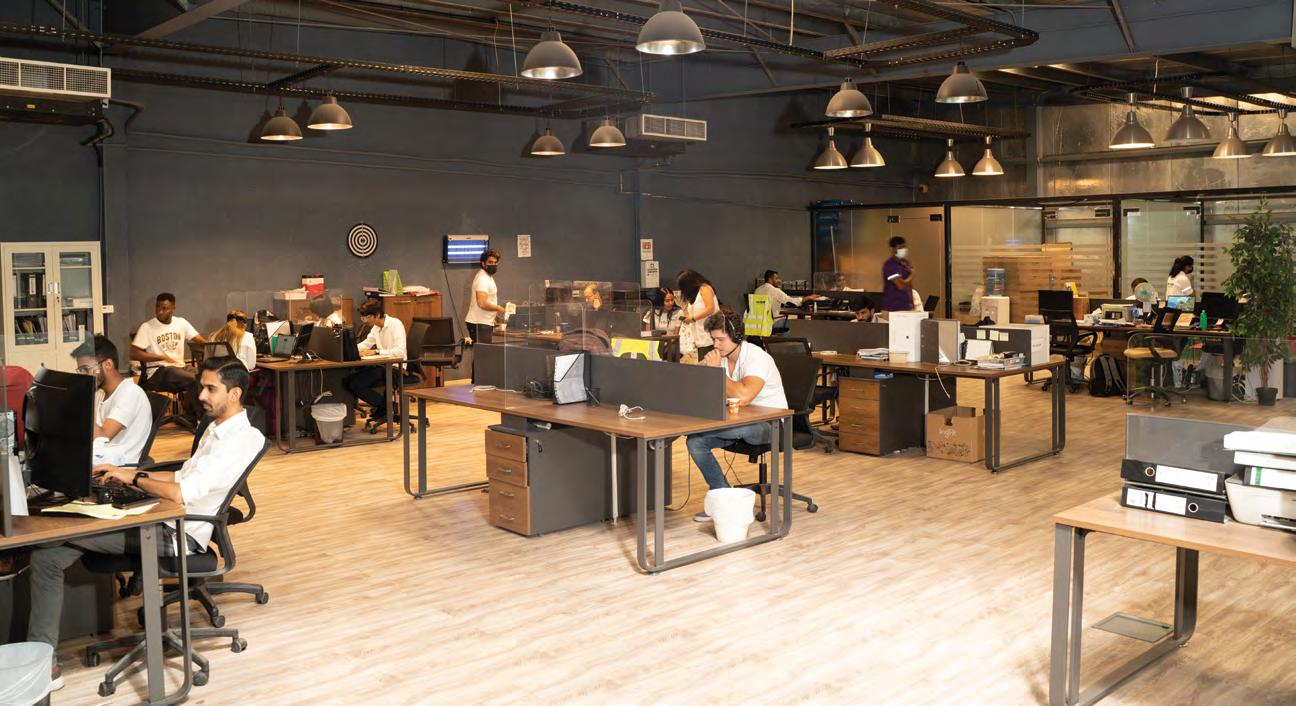
“WITH A STRONG LOGISTICS AND SUPPLY CHAIN INDUSTRY, THE UAE ECONOMY CONTINUES TO EXPAND STEADILY. BUSINESSES ARE INCREASING THEIR ONLINE CHANNEL INVESTMENTS, PARTICULARLY IN Q-COMM.”
Whereas, the Kingdom of Saudi Arabia is outpacing UAE (38% CAGR) in GCC e-commerce growth, with a growth rate of 39%. The fashion and beauty industries have experienced phenomenal development and are now among the most popular, competitive, and rapidly expanding e-commerce sectors. The Kingdom is focused on the innovation of three essential areas: digitisation, infrastructure, and e-commerce, in order to take advantage of the logistics sector’s untapped potential and support domestic growth.
According to the government’s Vision 2030 initiative, the growth of Saudi Arabia’s logistics industry may be ascribed to the country’s three primary industries’ rising logistical needs: food and beverage, pharmaceuticals, and internet enterprises. “By continuing to invest in the innovation of these industries, as well as the adoption of digital solutions to overcome pre-existing challenges, Saudi Arabia hopes to turn into a regional logistics and e-commerce hub,” adds Rodrigue.
The latest buzzword is supply chain disruption. The logistics sector captured everyone’s interest in COVID-19. Manufacturers, warehouse providers, transporters, and retailers need more time to fix their deadlines nowadays and require innovative solutions.
The previous two years have been crucial in shaping Transcorp’s new strategy, from addressing supply chain interruptions to developing new omnichannel fulfilment techniques. “Being at the hub of the supply chain, we took this challenge to new levels and created new procedures, cutting-edge supply and demand strategies, and im-

proved technology to address the issues with the new timely deliveries. Moreover, businesses in our field must constantly innovate to be competitive and keep up with the ever-changing technologies. Greater reach, quicker deliveries, and more affordable options are constantly in demand,” states Rodrigue.
“We had to overcome such challenges by developing a hybrid aggregation strategy without compromising quality and compliance when e-commerce in the region witnessed unexpected development. This concept is crucial in the current environment and is increasingly important in the cutthroat e-commerce market. With their growth in orders, our clients began significantly benefiting from lower prices. In addition, we have increased our presence in new markets, supported the development of regional emerging companies, and kept entrepreneurship inspiring.”

Parallel to this, Transcorp has noticed a fall in international trade and investment. They contend that significant recent events— including Brexit, the conflict in Ukraine, supply-chain disruptions, and the world energy crisis—have ushered in a brief period of deglobalisation. With the appropriate sourcing and strategic alliances, emerging nations will have the chance to move up the income ladder more quickly.
It is believed that businesses in the area no longer maintain a lean inventory model with a low stock level sufficient to fulfil demand. Instead, they have begun to shift how they view stock keeping. They have started hoarding more to be ready in case of another supply chain issue. “The shift from ‘just in time’ to ‘just in case’ has significantly increased our warehousing services, which has naturally had an impact on our delivery volumes,” remarks Rodrigue.
By 2040, it is estimated that 95% of transactions would take place online. “It’s time for retailers to face e-commerce problems and find solutions. As more customers rely on online shopping, in my opinion, a new window of opportunity will open for company leaders,” continues Rodrigue.

As we know, retailers were not prepared to manage the high number of transactions brought on by the COVID e-commerce boom, especially given the numerous integration touchpoints that every platform will have, such as payment gateways, shipping solutions, procurement and sourcing, and much more. Online channels stopped being a wholly integrated element of the firm then and turned into a side gig. Moreover, companies need to focus on implementing synchronised solutions, and here is where Transcorp may play a crucial role through its plugins, layers, and APIs – as the appropriate blend is required to connect internet channels to other business divisions.
However, with the proper solutions, data should be consistently collected at all touchpoints and put to the best possible use. Similarly, Transcorp assists companies with data analysis to better understand trends, consumer behaviour, and the ideal time to launch their subsequent marketing initiatives.
Among other things, having the correct tools is essential for engaging with your consumers effectively. Keep your current customers satisfied using tech tools, sometimes called customer service or logistical tools, that automate your activities. “In the long term, I think client retention is much more crucial and effective than customer acquisition,” says Rodrigue. However, surveys reveal that 50% of businesses continue to give the acquisition component priority. “This may result from investors’ pressure on businesses to gain new clients.” Yet, according to 70% of the executives of those businesses, keeping current customers is more cost-effective than finding new ones. Transcorp’s client retention programme has demonstrated its effectiveness with a less than 3% churn rate.
In the Gulf, the transportation industry is mainly dependent on fuel. In addition to considerable rises in the price of fuel, the cost of package delivery is increasing at an unprecedented rate. All parties must understand the interconnectedness of cost increases. For instance, raw materials also increase in price as oil prices do. Additionally, in a domino effect, when the price of raw materials rises, so do the prices for logistics and transportation. “You’re going to see that inflation reflects in the cost of goods and services to include first, middle, and last mile services as long as we have underlying inflation across the global economy.”
Landlords are hesitant to approve new long-term leases based on the present market prices. Therefore, signing a short-term lease now is in their best interests. “This dynamic will continue to pressure warehouse rent, which will affect the cost of warehousing services. The recent changes will significantly impact E-commerce retailers and their e-commerce fulfilment.” The tenuous supply chain, workforce shortage, and rising costs will make e-commerce fulfilment orders more challenging to complete. One important aspect is that online retailers must place product orders far in advance if they want to guarantee adequate stock levels and prevent stockouts, which will also raise their storage expenses.
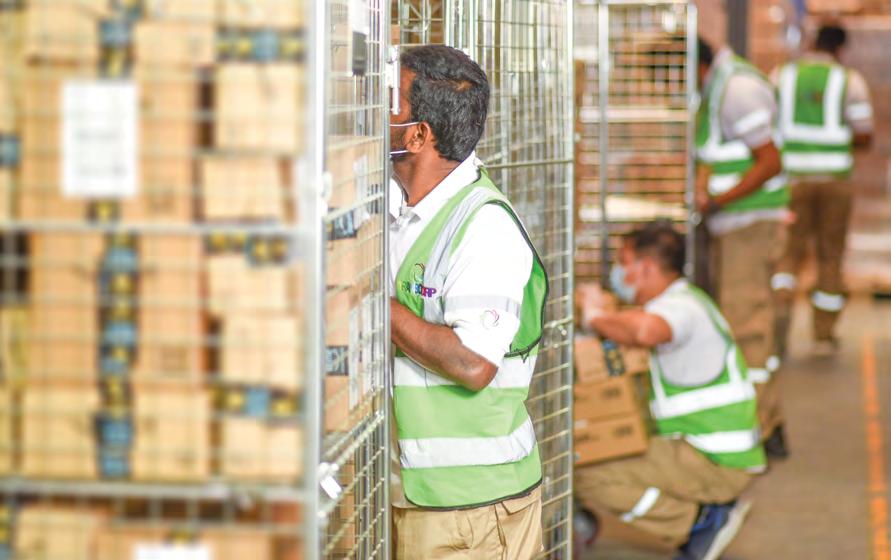
The primary issue for internet firms nowadays is to keep customers satisfied with prompt deliveries of high-quality goods. Some companies have gone as far as promising clients’ deliveries within a 10- to 15-minute window. “However, they rarely delivered on their promises, which left customers dissatisfied and businesses unable to live up to expectations. Transcorp makes it a priority to have openness, responsibility, and trust at the core of all our business dealings. This means that we guarantee our client’s satisfaction and prompt delivery of our services.” Notably, this has had a significant and favourable impact on their consumers’ positive reviews of the services. Many of their clients have evolved into some of their finest advocates, complementing personal conversations, online reviews, and wordof-mouth offerings.
FFor good reason, the pharmaceutical logistics industry ought to have the strictest regulations of all. The effectiveness of a product can be impacted by even the tiniest fault in shipping, storage, or delivery. In pharma logistics, control and quality are crucial. Following the pharmaceutical supply chain, best practices is essential to guarantee that goods are delivered
quickly and securely. “Since the outbreak, we have seen an increase in pharmaceutical shops compromising the accuracy of their delivery. Considering that they are providing aggressive delivery services at no additional expense, their main concern is to safeguard their margins.” Resulting in subpar deliveries that disrespect industry standards, temperature control, and general package cleanliness.
“We support quick deliveries in the pharmaceutical sector, but only when done correctly! How often have we witnessed a bike in our area bringing a drugstore order in a shoddy insulated bag? This posed a threat to life. By improving the procedures of any temperature-sensitive items, we are collaborating closely with regulatory organisations to end those practices. We must guarantee complete traceability. At Transcorp, we uphold the ethical pharmaceutical distribution methods supported by strict compliance standards.”
“IN THE LONG TERM, I THINK CLIENT RETENTION IS MUCH MORE CRUCIAL AND EFFECTIVE THAN CUSTOMER ACQUISITION.”
Transcorp’s stakeholders, who are as eager as the team to expand regionally as an ecosystem, are also enthused by the company’s expansion strategy. With growth strategies, Transcorp’s plans for the region are extensive and follow the company’s objective of becoming an innovative global cold-chain player, beginning with Qatar in Q2 2023, followed by the debut of Kuwait in Q4 2023, and Egypt is scheduled for Q3 2024. “We regard every day as an opportunity to move the company and its employees one step closer to a bright future. Our goal is to create a business where employees can prosper along with the business,” said Rodrigue.
In 2023, Transcorp will continue building and sustaining strategic alliances within the industry. “We believe in collaborative growth by developing and scaling our ecosystem. A new vertical will be launched, automation will be introduced, and further green initiatives will be added.”
Due to the pandemic, the market shifted from large-scale supermarket purchases to individualised pick-ups delivered to the client’s doors. Around 79% of consumers switched to online grocery shopping during the epidemic, and more than 47% anticipate keeping this change. The online grocery market in the UAE rose by roughly 73% in 2020.
The major players in the UAE market converted a portion of their online sales to offline sales and began delivering goods in 20 minutes or less to populated locations around the UAE and KSA.
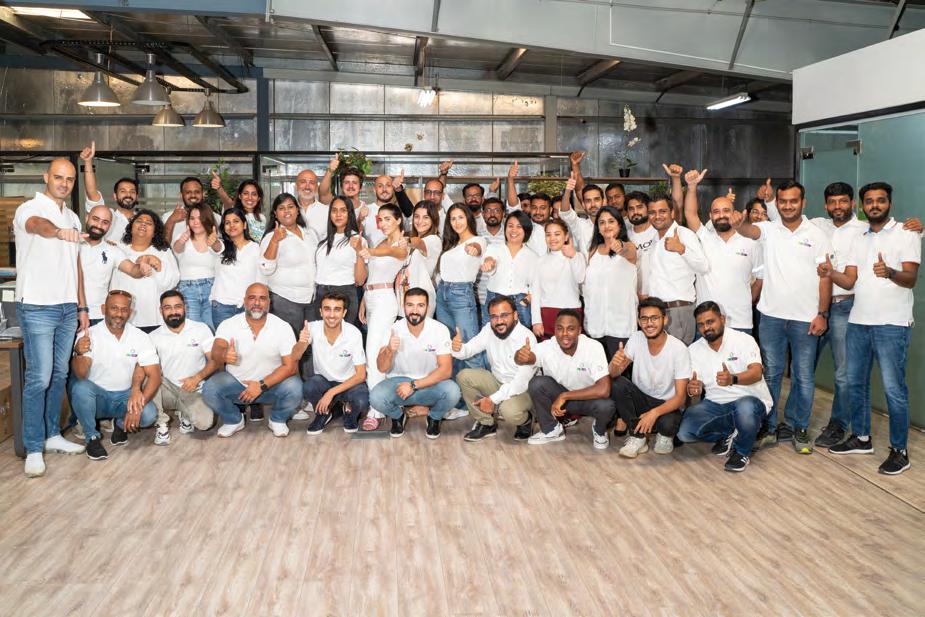
Transcorp will redefine the dark store business models in the region by providing a more excellent selection of goods, which benefits both the merchant and the end-user by giving them more options within realistic delivery windows. “Since we favour sustainable models, we won’t try the careless free delivery in 20 minutes model. Our research and analysis indicate that couples and families prefer a 90-minute delivery for large basket sizes.”
In order to achieve a fully automated operation by 2025, “our R&D team is significantly invested in introducing new automation to our warehouse business unit.” The automation plans are meant to boost accuracy and efficiency while enhancing worker safety.
Automation will help them process orders more quickly where humans are unable to match the accuracy and relentless pace of robots due to the on-demand model’s increasing popularity.
“Another objective for our R&D team is to improve space optimisation within our warehouses, allowing us to utilise every square inch of space within our warehouses. We will make our racks more space-efficient by converting wider aisles to compact ones with the aid of Automated Guided Vehicles (AVGs),” explains Rodrigue. With these technologies, Transcorp’s warehouses will be able to make more money from their cubic metres by needing less time and space to choose, pack, and ship online orders.
The largest domestic source of climate change is the transportation industry. This sector produces more greenhouse gas emissions than any other in the economy.
“We consider climate change to be a difficult task that calls for coordinated and collaborative efforts.” Real solutions will necessitate global action, but Transcorp will make decisions in its daily operations to lessen its environmental impact. To address the issue and develop a strategy to achieve net-zero carbon emissions by 2050, our team has already started several Environmental,
“SINCE WE FAVOUR SUSTAINABLE MODELS, WE WON’T TRY THE CARELESS FREE DELIVERY IN 20 MINUTES MODEL. OUR RESEARCH AND ANALYSIS INDICATE THAT COUPLES AND FAMILIES PREFER A 90-MINUTE DELIVERY FOR LARGE BASKET SIZES.”
Social, and Governance (ESG) projects.” Some of the initiatives that the company already has in place are the following:
> Route Optimization is a vital tool in achieving the company’s goal of reducing CO2 emissions by 50% by 2030. A geocoder included in the technology automatically completes incorrect addresses that are collected by the system. “It also keeps an eye on traffic and notifies our drivers when there are roadblocks. According to our delivery philosophy, drivers should make more stops per run while travelling fewer miles.” Fuel emissions can be significantly reduced with an effective routing that includes exact addresses and clear directions.
> Space Optimisation: Optimisation of space Transcorp loads the vans to capacity on every journey to ensure that the movements of its vehicles are optimised. Using the proper equipment will ensure smooth van loading, which will result in fewer vans and full runs. “By doing this, we lessen the number of automobiles on the road and their last-mile emissions.”
> Fuel Sensors: in every Transcorp vehicle comes a fuel sensor to monitor fuel consumption. Their system will alert its administrators with any sudden fluctuation in fuel usage versus the mileage crossed.
> Returns: Returned packages “Returns” or failed deliveries strongly impact the environment since it means doubling the amount of transportation and its CO2 emissions into the atmosphere. With their advanced and efficient end-to-end communication tools, they managed to reduce the returns and unsuccessful deliveries by 60%.
> Sustainable Packaging: As the ecommerce industry has grown, packaging manufacturing has also increased, leading to higher CO2 emissions. A package already causes environmental harm before it is securely delivered to the customer’s door. A single container can have up to nine types of packing materials; examples include tape, cardboard boxes, bubble wrap, paper wrap, and Styrofoam padding. All this extra packaging is thrown in the trash. To minimise plastic usage, “we are closely collaborating with our clients to offer easy-open packaging made of 100% recyclable cardboard. Transcorp uses packaging that is recyclable, compostable, and biodegradable.
Our warehouse management system is equipped with all the necessary technological instruments to help us choose the appropriate package size for the goods.”
By 2025, Transcorp plans to launch a few new initiatives, including assisting universities with cutting-edge green logistics programmes, researching the viability of EV use in the area and the temperature-controlled industry, switching 25% of the power usage to solar energy for their warehouses, adopting waterless technology for carwashes, and constructing a water recycling system beneath for their carwash garage.

“We believe climate change provides enormous difficulties and great potential for improved and greener transportation systems,” says Rodrigue.
Lastly, entrepreneurship is increasingly seen as the ideal method to amass wealth while living life to the fullest in the YOLO economy. Finding the perfect product/market fit and building profitable businesses are challenging tasks. The journey has been idealised by the success of well-known tech entrepreneurs by the international media, yet there are
more failures in those journeys than successes they need to be aware of. A discipline that has been upheld over time and involves regular ‘fire-fighting’ only to keep the business afloat defines the spirit of an entrepreneur. Whatever the nature of the issue, business owners must maintain composure and focus on solutions. Although there is no one-size-fits-all manual for successful entrepreneurship, it is essential to know where you are to concentrate on the activities that will have the most considerable positive effects on your company.
On an ending note, Rodrigue shares some wise thoughts saying, “New business owners should educate themselves about and concentrate on these two metrics: profitability and a solid cash flow. I strongly advise young entrepreneurs to do this. I had to learn it the hard way, but I’m willing to share it now. The importance of confidence in any entrepreneur’s journey is something I would want to emphasise. Things will work out if you always have confidence in yourself, welcome criticism, and adjust swiftly to market developments.”
His Highness Sheikh Mohammed Bin Hamad Bin Tahnoon Al Nahyan chairs the RoyalJet LLC, an Abu Dhabi-owned and controlled collection of firms that dominates the worldwide premium private aviation market. RoyalJet is also a multiple World Travel Awards laureate in the ‘World’s Leading Private Jet Charter’ category, and its FBO has received other awards for its facilities and services.
The logistical operations for RoyalJet involved a wide range of activities designed to ensure the smooth and efficient operation of the company’s aviation services. From fleet management Nd ground handling to supply chain management and customer service, the private aviation provider caters to all legs of the logistical operations for a smooth service offering for its clients.
Bottom of Form
Fleet management
RoyalJet has been managing its fleet of aircraft, including maintenance, repairs, and upgrades. We have also been working on our crew scheduling – scheduling pilots, flight attendants, and other crew members to ensure that there are always enough personnel available to operate the flights.
Where they schedule their flights, considering factors such as fuel requirements, airspace restrictions, weather conditions, and customer preferences.
They have been actively arranging airport ground handling services, including baggage handling, aircraft fuelling, and ramp services.
To ensure high-quality customer service to our clients, including responding to inquiries, making reservations, and handling any issues that may arise during travel.

Regulatory compliance
Focusing on complying with various aviation regulations, including those related to safety, security, and environmental protection. This also involves working with regulatory agencies and obtaining necessary certifications and approvals.
Supply chain management RoyalJet has been working on its supply chain, including sourcing and procuring the goods and services we need to operate.
The year 2021 has been the busiest worldwide business jet activity. The Middle East area had some of the most rapid rise in business jet demand, particularly from the UAE, which increased by 73% year on year. Likewise, in 2023, the Middle East business aviation market will continue to expand. During the recovery phase last year, demand outpaced
supply in the region’s premium aviation business.
“The overall health of the global private jet market has been going strong, and this growth is expected to reach greater heights in the coming months,” says Mohamed Husain Ahmed, CEO of RoyalJet.
“We have also witnessed an upward growth trajectory since the second half of last year, especially with the increased demand for private aviation within the GCC due to the FIFA World Cup in Qatar.”
The region’s strategic location as a hub between Europe, Asia, and Africa has also contributed to the rise of the Middle East’s private aviation business. Globally, the private aviation industry has expanded recently as leisure and business travel demand has increased. However, the COVID-19 pandemic, on the other hand, has had a substantial influence on the aviation industry, particularly the private aviation sector, with many firms reporting lower demand and operating issues as a result of travel restrictions and other measures. To remain competitive and satisfy the needs of their clients, firms in the private aviation sector must stay up to speed on market conditions and adapt to changing situations.
“The RoyalJet mission is to deliver personalized services to each of our guests, and we are committed to exceeding customer expectations at every
step of their journey. In general, the private aviation market in the Middle East has been growing in recent years, with increasing demand for luxury travel and business travel in the region,” said Mohamed.
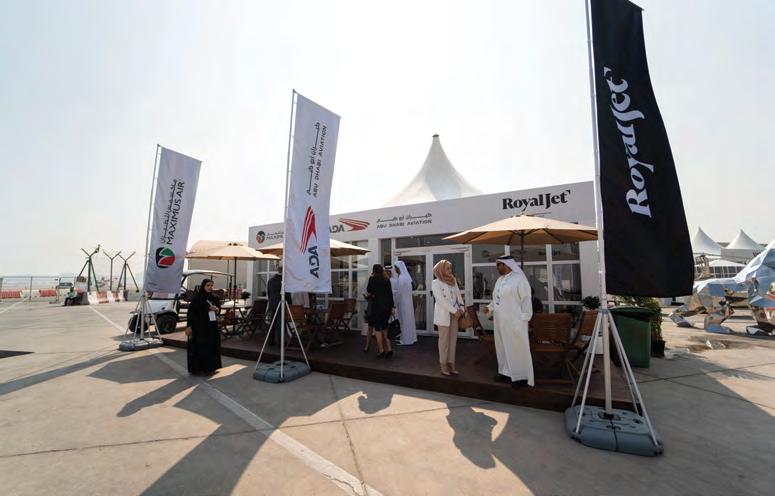
RoyalJet’s biggest priority is to ensure that the aircraft they are flying on is safe and well-maintained. They say customers look for a comfortable and luxurious experience when flying, including amenities such as comfortable seating and high-end in-flight catering, and we offer them the best in our aircraft.
Mohamed adds, “Our customers rely on us for flights for business or other important travel and are concerned with the reliability and punctuality of the service.”
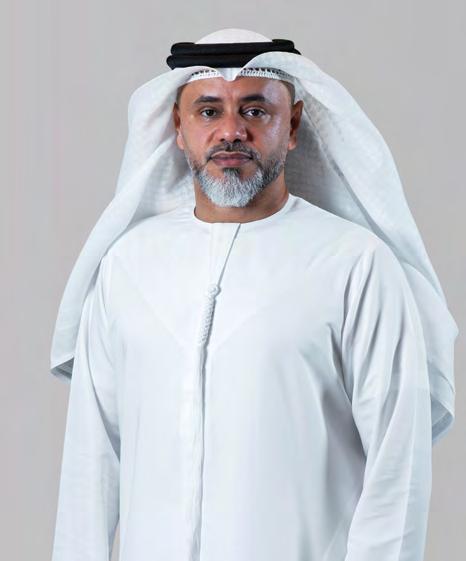
Additionally, some private aviation customers may be concerned with privacy and security when flying and may be looking for options that offer a higher level of privacy and security. At RoyalJet, they offer the highest level of confidentiality to ensure that the passenger travels hassle-free.
Because of the region’s significant concentration of ultra-high-net-worth individuals, the GCC is one of the most promising markets for business aviation. Foreign charter providers are attempting to enter the market, increasing competition. Likewise, companies are seen concentrating on adopting
technology, which is projected to push their growth even further – the GCC countries are witnessing an increase in demand for new business jet models with larger passenger rooms and ranges.
“Without a doubt, there is high demand for private aviation, which will grow in the next few years – as people increasingly opt for private charters to save time and travel accordingly to their tailored schedules. We see a certain growth in this sector, especially in the region. The UAE is becoming a hub for people in business, celebrities, and ultra-high-net-worth individuals, and we understand that there will be a growing need to fly private in the next few years. In addition to providing the best premium private aircraft in the world, we aim to deliver the highest levels of service to our guests every time they fly,” states Mohamed.
Lastly, RoyalJet aims to tap into enhancing the experience they provide to their clients in luxury and business travel.
“THE OVERALL HEALTH OF THE GLOBAL PRIVATE JET MARKET HAS BEEN GOING STRONG, AND THIS GROWTH IS EXPECTED TO REACH GREATER HEIGHTS IN THE COMING MONTHS.”Mohamed Husain Ahmed, CEO of RoyalJet

Grand Millennium is home to one of the most fun spots to hang out in the emirate. In addition, a restaurant’s success depends on the warmth of its staff and the calibre of the food and drinks it serves, which facilitates a seamless logistics and supply chain. Housing restaurants like Belgium Beer Café, Lucky Voice, Hitchki, and Lock Stock and Barrel, to name a few, Logistics News ME brings forward a part of their behind-thescenes operations.
To maintain a smooth operation in supply chain management, it is essential to evaluate suppliers and their products
before making any purchase. We always recommend seeing a physical sample of the requested products to pass our due diligence before deciding to examine quotes and finalize a purchase. This is to ensure we achieve the best desirable outcome from the purchased products of the selected suppliers.
The biggest challenges during any purchase include estimated delivery time and product quality. This remains a critical factor in purchasing the desired products as it can affect future relationships with suppliers if operations don’t go as planned. Late deliveries cause unnecessary delays that prove to be unsatisfactory. Quality of products is also important to us as it can affect the hotel’s overall operations about not only guest complaints but also several
other departments, such as engineering and F&B, and many more within the hotel.
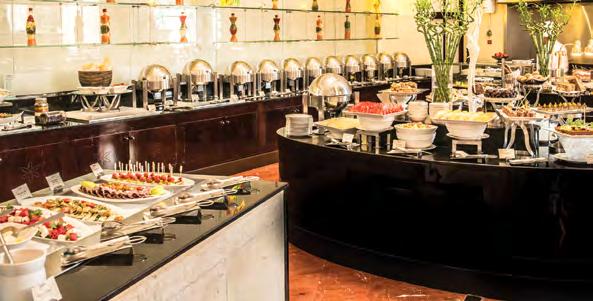
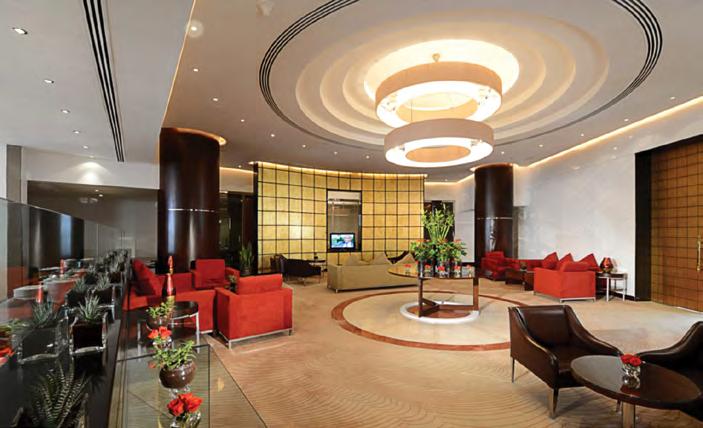
What policies/ elements have you adapted at Grand Millennium Dubai Barsha Heights for a smooth implementation of logistical operations?
To follow a smooth implementation of logistical operations, we make sure to purchase products when the store needs more than those items or at least 20 days before the event date. This allows us enough time to revise and review products before they reach our guests and to ensure we prevent unnecessary delays and costs. By adequately implementing operations from our selected suppliers, we can build longterm relationships, which helps better communication and trust between the two parties.
How does supplier consolidation support the smooth functioning of Grand Millennium Dubai Barsha Heights?
We have a list of suppliers we usually order from, and these are based on continuous years of built trust, previous purchases and the credit terms we have set. This is an essential factor for us as we can maintain a smooth, long-
term relationship and achieve desirable satisfactory outcomes through time and costs for the hotel.

How does purchasing power play a vital role in the hospitality industry?
We understand that purchasing takes a huge responsibility to maintain a smoothly running, lucrative hotel. The hotel always has unique needs that are not shared by any other industry. Therefore, we follow a set line of processes through our brand standards and initial procedures to reduce costs, ensure quality, productivity and stability are maintained and are on par with what our guests and clients expect from our business.
When do you make a supplier a partner?
Choosing a desired supplier as a partner is challenging as it requires a lot of negotiations and communications for the selected products. We make a supplier a partner when we reach a desired set level of transactions and are promised to supply the same product with the same quality standards we agreed on with our initial purchase. Becoming a partner requires high reliability, responsiveness and flexibility to maintain smooth operations and achieve desired success for the business.
How do you focus on aligning procurement as a business function with overall business objectives?
We are keeping close track of changing business goals and priorities. As a well-connected team, we are very well aware of the needs and wants before we send out any inquiry. We always set procurement KPIs to ensure every single one reflects not just a procurement goal but an organizational one. We also conduct regular and ongoing “alignment checks” to ensure procurement activity remains relevant and focused on the right things.
The current market is saturated with many suppliers providing the same product. This is a
challenge as initially, they would offer an excellent quality product for decent pricing, but they need to assure a set standard on either of those points for future orders. They always compromise on quality or price, forcing us to look for better suppliers in the market.
“TO MAINTAIN A SMOOTH OPERATION IN SUPPLY CHAIN MANAGEMENT, IT IS ESSENTIAL TO EVALUATE SUPPLIERS AND THEIR PRODUCTS BEFORE MAKING ANY PURCHASE.”

Majid Al Futtaim originally franchised Carrefour, one of the leading grocery brands in the area, in 1995. The company currently holds the right to run the brand in over 30 nations in the Middle East, Africa, and Asia – today, with more than 400 Carrefour shops in 16 countries, serving around 750,000 consumers each day. Bringing forward all the details you would like to read about the day-to-day logistical operations.
What special measures were implemented in the supply chain for Majid Al Futtaim Retail in 2022 to cope with the post-pandemic situation?
Food security has been one of the most critical aspects of grocery retail since the pandemic’s arrival, not only in the UAE but globally. As the logistics and supply chain challenges we face continue to evolve, we must double down on our commitment to cost control in order to keep rising prices from being passed on to our customers.
Pre-pandemic, grocery retailers could rely on suppliers to fulfil orders accurately and quickly. However, securing goods, especially fresh produce, became a challenge during the pandemic, the legacy of which continues to present obstacles today. Planning during the pandemic became a real challenge and a critical supply chain concern for regional retailers.
We navigated this challenge by sourcing for multiple countries, mainly within the GCC, in our negotiations and direct farm sourcing from one country’s operations to another. We stocked up on
non-perishable and long-life products where possible, allowing our team to anticipate and mitigate critical inflationrelated business pressures.
We also took other proactive measures by consolidating our purchases in some categories to take advantage of our reach. For example, our size enabled us to buy on behalf of all our markets – negotiating with suppliers to ensure a
mutually beneficial outcome and eventually providing better prices to our customers.
While sourcing from local suppliers still needs to become more competitive for mass market distribution, our strategy is to help local suppliers grow their businesses and supply major retailers in every market where we operate. In doing so, we forecast that we can double
the volume ordered from local suppliers, generating new opportunities locally and leading to a 5% to 7% savings in total.
As we emerge from the pandemic, we are committed to finding ways to improve as well as test new solutions to maintain robust supply chains and offer unparalleled value for Majid Al Futtaim customers.

“PRE-PANDEMIC, GROCERY RETAILERS COULD RELY ON SUPPLIERS TO FULFIL ORDERS ACCURATELY AND QUICKLY. HOWEVER, SECURING GOODS, EXCEEDINGLY FRESH PRODUCE, BECAME A CHALLENGE DURING THE PANDEMIC, THE LEGACY OF WHICH CONTINUES TO PRESENT OBSTACLES TODAY.”
How do you plan to apply automation and AI in the logistics and supply chain?
AI and automation play a pivotal role in the digital transformation of supply chains. A report by Precedence Research suggests that global AI in the retail market is projected to surpass USD 45 billion by 2032.
At Majid Al Futtaim, we are fully aware of this potential and the level of
transformation that technology will bring to retail and the broader economy. With that in mind, we have made significant progress in our digital transformation journey since we first embraced it five years ago. For example, we collaborated with US-based e-Grocery innovator Takeoff Technologies to bring the latest robotised picking technology to Carrefour, allowing up to 2,000 items to be picked per hour per automated fulfilment centre. This digitised storage picking technology automates managing orders, significantly reducing the processing time by up to 50%.
Please elaborate on the regional breakdown for Majid Al Futtaim Retail’s logistical operations.
Majid Al Futtaim Retail serves over 750,000 customers daily across its 16 markets and, as a result, has strength in predicting and meeting customer demands. We work closely with local suppliers in each of our operating markets, and we are proud that more than 80% of our
products are sourced from the region to support local producers, suppliers, families, and economies. We are utilising different skill sets and technological innovations to continue leading the digital transformation curve in grocery retail, including introducing more fulfilment centres in response to the growing demand following COVID-19. For example, Carrefour KSA recorded a 285% increase in online sales in 2020, and we reacted quickly to address this demand by opening multiple fulfilment centres across the Kingdom. We remain committed to expanding our logistical capabilities to meet evolving customer needs.
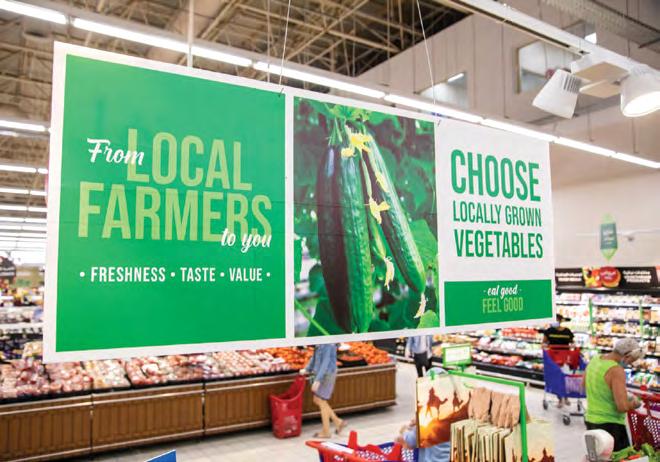
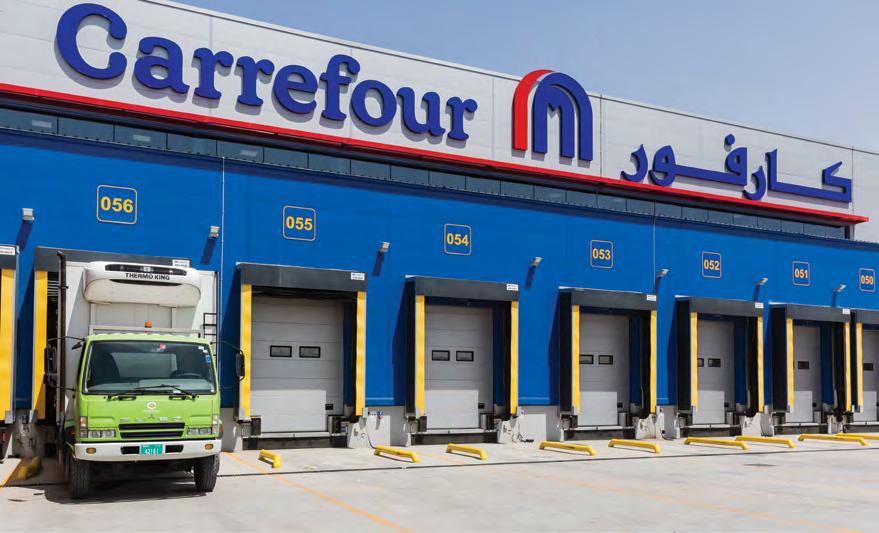
Do events like the RussiaUkraine war have adverse effects on the operations? If so, how do you cope with these time-sensitive events?
As the conflict in Ukraine approaches one full year, it continues to impact supply chain operations globally significantly. It has caused ongoing disruptions in the flow of goods and services in this region, resulting in higher costs, delays, and supply shortages. The conflict has also caused uncertainty in the market, making it difficult to make long-term plans.
The ongoing situation in Ukraine reinforces the imperative for organisations to develop more resilient supply chain operations. Of the most critical vulnerabilities witnessed today is an overreliance on commodities from a single market or region. Majid Al Futtaim navigates this by sourcing more than 80% of its products from the MENA region. This commitment to sourcing locally also supports producers and suppliers,
families and economies in our locations. We will continue this approach by sourcing first from the best producers and trusted companies in our local markets before looking further afield to the region and international suppliers.
Would adopting blockchain aid you in achieving a seamless logistics process in your line of work?
Blockchain can enable us to enhance supply chains through faster and more cost-effective product delivery, improving product traceability, boosting partner coordination, and facilitating access to funding.
At Majid Al Futtaim Retail, we introduced IBM Food Trust, a blockchain-enabled global ecosystem for the food industry run on IBM Cloud. This initiative made Carrefour the first retailer in the region to offer better insight and transparency to our customers about the origin of their food via end-to-end visibility on products throughout the supply chain from farm to shelf. This in turn, promoted increased quality, credibility and safety for shoppers. The complete
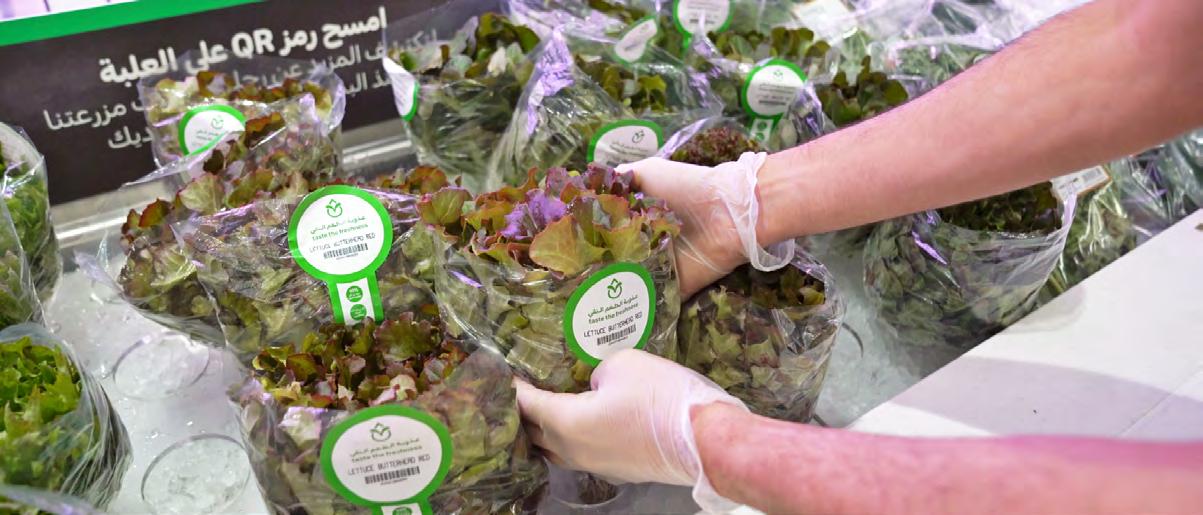
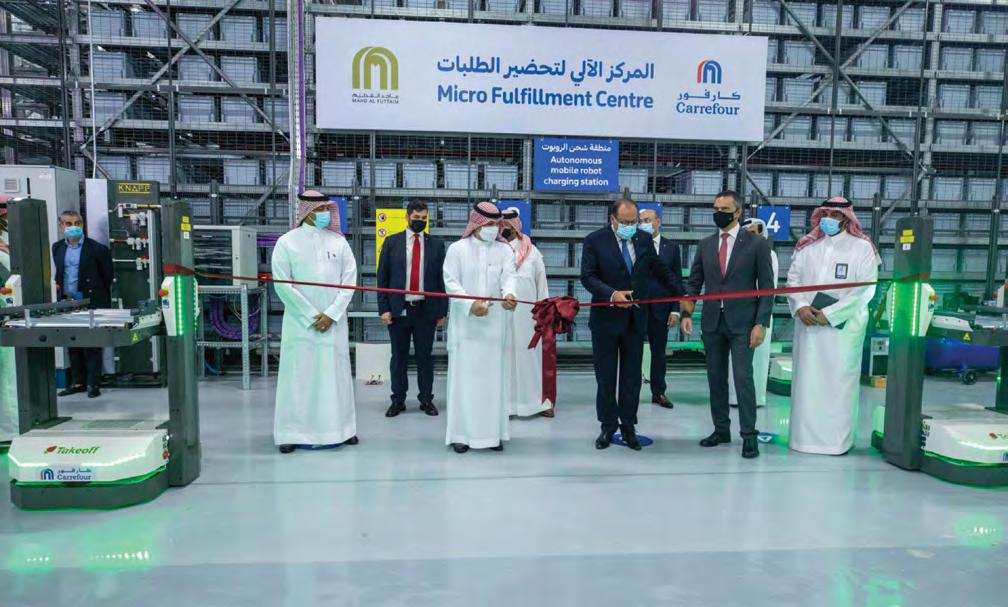
history of the production process, the current location of participating food items, and accompanying information, such as certifications, test data and temperature data, are readily available once uploaded onto the blockchain.
What growth opportunities are you planning to be tapping into in 2023?
Retail is constantly evolving, and – as a forward-thinking and agile brand – we are excited to pioneer new
concepts and services that anticipate the needs of our local communities.
In 2023, we remain committed to providing our customers with the best value for money, including the best price, quality, and omnichannel experience. Our data shows that customers are increasingly shifting toward buying goods on promotion. For example, in Oman and Kenya, we nearly doubled promotional sales – and in Pakistan, there is already high
promotion penetration at 44%.
Leveraging these insights, we are well-positioned to take significant steps to ensure consumers can access all the products they require.
HOW IS THE GROCERY POWERHOUSE RUNNING ITS OPERATIONS IN THE REGION“RETAIL IS CONSTANTLY EVOLVING, AND WE ARE EXCITED TO PIONEER NEW CONCEPTS AND SERVICES THAT ANTICIPATE THE NEEDS OF OUR LOCAL COMMUNITIES..”
Praga has relocated to the United Arab Emirates for the car’s first public displays, beginning with a lavish launch event staged on a Saturday night last month at The Space in Dubai, three weeks after introducing the new road-legal Bohema hypercar.
The lightweight, track-focused, and road-legal Bohema was presented in front of members of the UAE Royal families, hypercar collectors, and supercar aficionados against the appropriate background of one of the UAE’s most significant hypercar collections.

Mark Harrison, Sales and Marketing Director and CEO of Praga Cars UK, said, “It’s a very significant moment in Praga’s 115-year history. I have enjoyed working in the region and believe the unique mix of Bohema’s engineering, performance statistics, stunning looks, and build quality will turn heads here. I am convinced hypercar collectors in the Middle East will love this car.”
A unique luxury carbon table created by Praga’s Design Director, Juraj Mitro, and a Praga R1 that won the Dubai Autodrome race was also on show at The Space for the big presentation. On the night, it was made known that a
Bohema with complementary details may be specified with Juraj’s limited edition carbon tables.
Although the Bohema and the R1 have no parts in common, Praga’s three philosophies—carbon construction, lightweight engineering, and eye-catching design—are shared by the table, the race vehicle, and the hypercar.
After the inaugural ceremony, Praga will provide private viewings at The Space and Dragon Racing, the official Middle Eastern distributor for the brand’s race cars, located at the Dubai Autodrome. By finding the company in the UAE until March, while a new UK global brand centre is being built in the UK, early 2023 will see the addition of outdoor development sessions and test drives for depositors. This will be the ideal chance to demonstrate the Praga Bohema’s capabilities, which is 700hp at under 982kgs.
Last but not least, only 10 of the limited runs of just eight Bohema automobiles will be distributed to consumers in 2019, with the production of the car not beginning until the second half of 2023: Praga is already accepting reservations for 2024 and has already agreed to sell the last vehicle, number 89, to a US client.
and can help retailers at every step of the e-grocery business process, be it a fulfilment, last-mile delivery or analytics for informed business decisions. The wide range of tech modules and high flexibility of our solutions help to meet the most complex customer needs,” adds Max.
Yango Deli Tech also offers exclusive technology and knowledge to retailers and E/Q-Commerce.
Following this, when a retail business decides to go online, it either tries to develop its technology or chooses thirdparty solutions for each segment or stage in the process, integrating them into its infrastructure and producing a cumbersome and complex system that could be more efficient. To increase efficiency, businesses aim to introduce their products into the market, giving up some of their brand identity.
Yango Deli Tech provides the infrastructure for our clients to go online, helping them to avoid the unnecessary costs of maintaining non-core functions. “We also allow businesses to scale fast — leapfrogging the competition,” says Max.
In an exclusive interview with Logistics News ME, Max Avtukhov, CEO and Co-Founder of Yango Deli Tech, tells us about the company and its plans
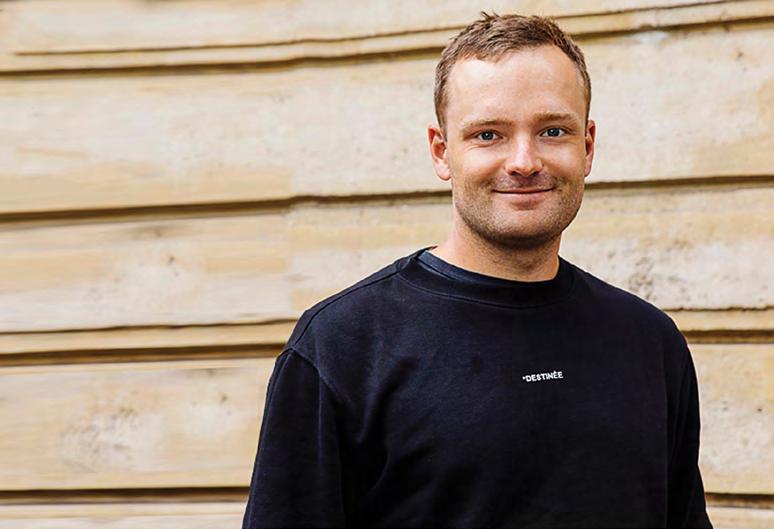
Yango Deli Tech believes that the e-grocery business in these areas has much promise and is growing fairly quickly. The MENA e-grocery sector is worth roughly 25 billion USD and has room to expand. The average order is one of the largest in relation to the cost of fulfilment and delivery, and estimations indicate that Dubai has the potential for at least double the number of daily deliveries. The number of employed individuals, their income, and their use of grocery delivery services are all expanding. The most cutting-edge technologies are a driver for the continued market share growth because the Middle East has a 4% penetration rate for e-commerce.
At the same time, service providers still need to be at the desired level of maturity. For instance, e-grocery businesses had double-digit growth even when 20 to 30 per cent of orders were missing products.
“We believe that with our proprietary tech, we can help local companies that want to capture a significant market share of e-grocery fuel their exponential growth and together with them, we can transform the e-grocery sector in the region,” says Max Avtukhov, CEO and Co-Founder of Yango Deli Tech. “Our tech solutions will allow customers to receive their goods on time and in full, raising profitability and overall efficiency for the grocer.”
While most businesses focus on individual aspects of logistical problems, such as the last mile, mid-mile, or fulfilment, Yango Deli Tech offers an endto-end tech stack. “Our solutions include a variety of features for the fulfilment, delivery, client experience and analytics; it ranges from essential functions such as warehouse management systems and ERP systems to AI-based demand prediction and dynamic surge systems. We understand the process end-to-end
For companies with a footprint in e-grocery, we help improve unit economics, which is a significant pain point for many Q-commerce players.
“According to our estimates, by using our solutions, our client can achieve assembly time reduced by 50% thanks to instruments for pickers aimed at quality check and in-store logistics efficiency improvement, almost 100% stock accuracy – by implementing the innovative Warehouse Management System, cancellation rate can also be cut by up to 35% by using a machine learningbased model that predicts supply-demand balance for each warehouse to control CTE. All this translates into revenue growth that our clients usually witness in a matter of months.”
Lastly, their unique solutions can assist merchants in achieving their ESG objectives. It uses innovative autoreplenishment technology and a carefully thought-out dynamic discounting system to decrease food waste by up to 40%. By determining the most practical path for couriers and logistics while minimising unnecessary miles, the smart routing solution and batching algorithms assist in cutting fuel use and CO2 emissions.
We launched Goodyear Groove at Automechanika 2022 last month on the traditional front. It is a range of fully synthetic SP-grade gasoline engine oils for high performance in a new series of engines.
How are these new ranges of oils and lubricants produced and manufactured?
Alonsa Electric Group (a member of Al Tara Group since 1978) revealed at Automechanika 2022 a comprehensive portfolio of Goodyear engine oils throughout the Middle East, Africa, and Asia, totalling to 72 kinds of lubricants with over 300 SKUs. Moreover, Goodyear is one of the world’s largest tire companies which strives to develop state-of-the-
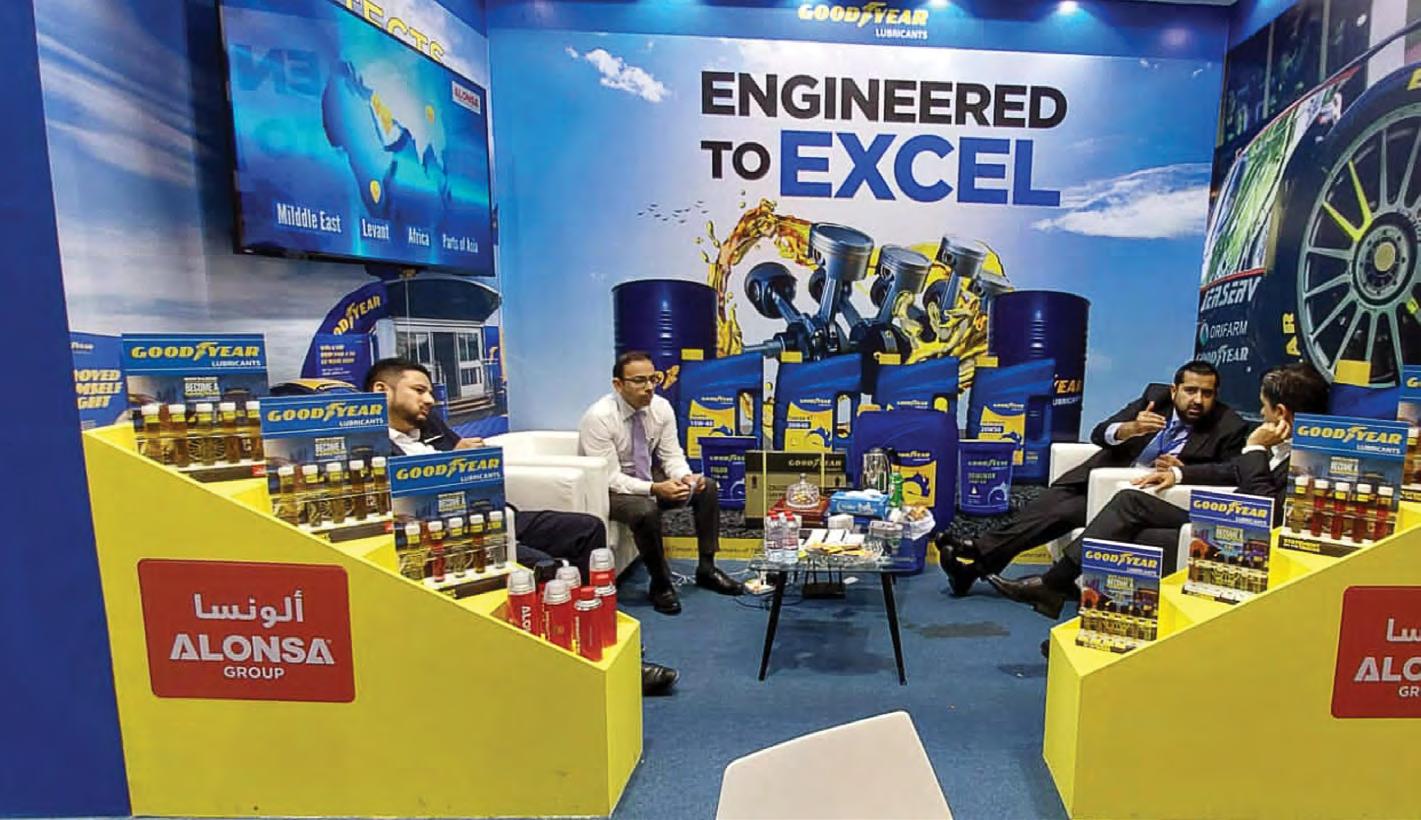
art products and services that set the technology and performance standard for the industry.
Could you please brief us on this new range of oils and lubricants?
Goodyear Lubricants has been developing fluids for electric cars, such as coolants, brake fluids, transmission fluids and greases for heavy industrial applications.
The petroleum-derived lubricating oil is made up of a mixture produced by atmospheric and vacuum distillation of selected paraffinic and naphthenic crude oils. Afterwards, chemical changes may be required to refine the product’s properties.
We go through a stringent quality control departmental process with our multinational blending partners to ensure our lubricants are up to the mark with ongoing market trends.
What unique elements are adapted in the new range?
The new range of fluids and greases is catered to the electric vehicle segment. We forecast a lot of light vehicles entering the logistics segment over the next two years. Many companies will transition to electric trucks for distribution needs, and at Goodyear Lubricants, we are starting very early to ensure we have a complete range of electric vehicle fluids for the light commercial vehicle segment.
What unique technology is used to produce this range?
We have technology transferred from well-known multinational R&D centres to meet the market’s lubricant grease and fluids requirements. The demand for optimized fluids requires ensuring performance in thermal management, energy efficiency, corrosion resistance, and oxidative stability, amongst other factors. Group 3|4 & 5 synthetic-base
oils help formulators achieve these impressive performance goals. It is essential to develop optimized formulations to meet the needs of the growing market.
What are the particular oil components that can help maintain a car?
Engine oils are composed of two essential components: base oils and additives. The base oils constitute 70-90% of the total and are created from natural gas or crude oil, while additives round out the remaining 10-30% and can be various things. The right mix of the above two ensures the smooth function of any vehicle.
Fluids are composed of water-based glycol chemicals. Goodyear Lubricants are planning on investing in R&D to strengthen its foray into this - the future of mobility fluids.
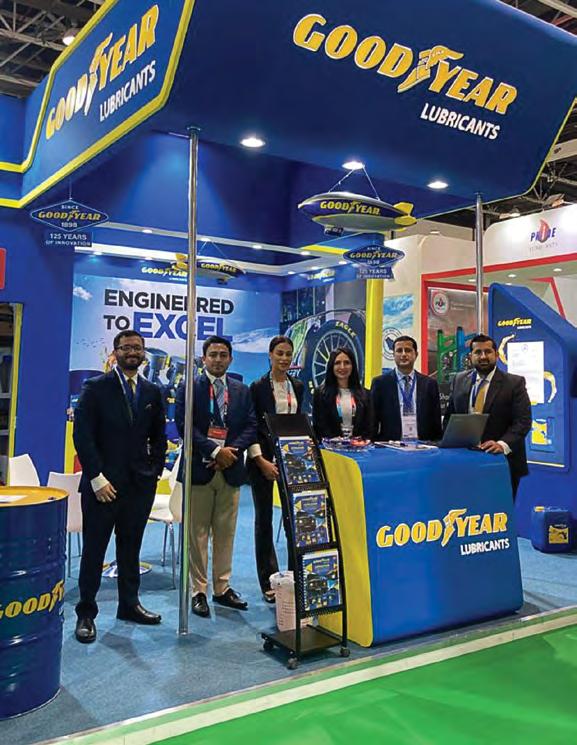
Logistically, how are you planning to supply this product range in the region? We intend to cater to the light vehicle commercial electric market as soon as it starts being launched and growing market share in the region.
Are you planning to advance the supply chain operations in the GCC?
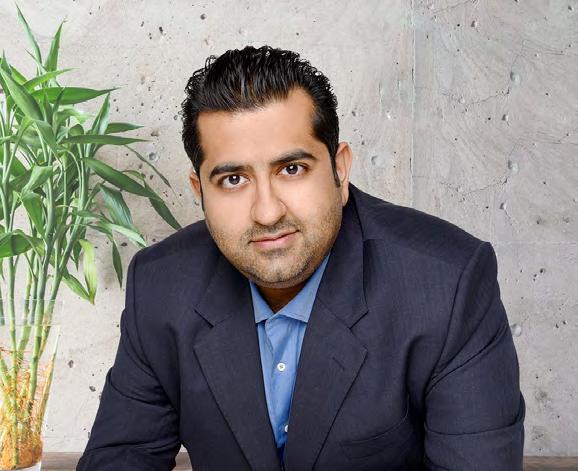
We intend to stock our product varieties with key 3PL across the region for faster delivery to the end markets.

What is your opinion on the growing automobile industry in the Middle East?
Despite a slowdown in recent years brought about by the Covid-19 pandemic and disruptions in global supply chains, 2022 saw the automotive industry adapt and move forward on several fronts.
As the need for more extraordinary technology in the automotive industry increases, we are dedicated to building cleaner and greener options as we harness innovations being made globally.
“WE GO THROUGH A STRINGENT QUALITY CONTROL DEPARTMENTAL PROCESS WITH OUR MULTINATIONAL BLENDING PARTNERS TO ENSURE OUR LUBRICANTS ARE UP TO THE MARK WITH ONGOING MARKET TRENDS.”
“With the winter season being underway in the UAE, we are thrilled to launch the latest PowerHouse series to provide power for endless possibilities to outdoor enthusiasts. The modern outdoor lifestyle requires power for practical gadgets and appliances as well as personal electronics,” said Faraz Mehdi, General Manager, Anker Innovations Middle East, Africa and South Asia.
“Beyond simple wattage metrics, the Anker PowerHouse series represents a new generation of mobile battery generator offering the greatest degree of flexibility between portability and power capacity to satisfy each user’s unique needs for their outdoor lifestyles.”

The PowerHouse series has an energy-saving mode that turns the station off automatically after all connected devices have fully charged to ensure energy efficiency. In contrast, users can stop the energy-saving mode to guarantee that their devices will stay charged for longer, such as while taking time-lapse pictures or movies. Additionally, the station series can keep you and your loved ones safe in the dark or during a blackout, thanks to a built-in LED light. On the front of the stations, an easy-to-read LED display further displays the battery’s remaining capacity, the current input and output status, and the anticipated recharging time.
Anker 535 Portable Power Station
One of the world’s foremost manufacturers of mobile chargers, Anker, has debuted its latest line of PowerHouse power stations in the United Arab Emirates. The Anker 757 Portable Power Station (PowerHouse 1229Wh), Anker 535 Portable Power Station (PowerHouse 512Wh), and Anker 521 Portable Power Station (PowerHouse 256Wh), equipped with the most recent technologies, provide a wide variety of ports in portable designs to satisfy the needs of any outdoor enthusiast.
A lithium iron phosphate (LiFePO4) battery, similar to those seen in contemporary electric automobiles, powers the new series of high-capacity PowerHouse stations, providing six times the utilization of ordinary batteries. Compared to lithium-ion batteries, LiFePO4 batteries have better discharge and charge efficiency. The stations have been built using corrosion- and temperature-resistant automotive-grade aluminium alloy that offers unsurpassed endurance to survive the roughest environments.
A portable power station with many charging ports, a built-in lighting bar, and a challenging build is the Anker 535 Portable Power Station. The 535 stations can charge any mobile device, including smartphones, tablets, and laptops, as well as small appliances and medical equipment like CPAP machines, thanks to its 512Wh (138k mAh) power capacity and 500W total output power. This makes it the perfect tool for outdoor activities like trekking and camping without access to power. It may also be helpful during blackouts or natural catastrophes.
Anker 521 Portable Power Station
Anker’s entry-level portable power station, the 521 Portable Power Station, has a power capacity of 256Wh (698k mAh) and a 200W total output power. The station has a 50,000-hour life expectancy, five times longer than the market average. It is also highly sturdy and practical, with a drop-proof construction and components that meet industry standards. Any outdoor enthusiast looking for a portable companion should choose the PowerHouse 521.
Anker 757 Portable Power Station
The Anker 757 PowerHouse is the most sophisticated and durable portable battery generator in the world, with a power capacity of 1229Wh (330k mAh) and a 1500W total output power. The Anker 757 PowerHouse can be charged from empty to more than 80% capacity in just one hour, as opposed to other power stations on the market that take several hours to recharge. HyperFlash technology, a bi-directional converter that carries electricity from the regular AC outlet quicker, makes the fast recharge feasible. The Anker 757 PowerHouse provides a record-breaking 5-year complete device guarantee, three years longer than the industry standard.

Regardless of whether it is a rigid chassis, concrete mixer or heavy-duty tipper: The Mercedes-Benz Arocs provides an especially robust, resilient vehicle that is optimally prepared for use for any construction haulage challenge. Configure it now to suit your requirements and those of your project.
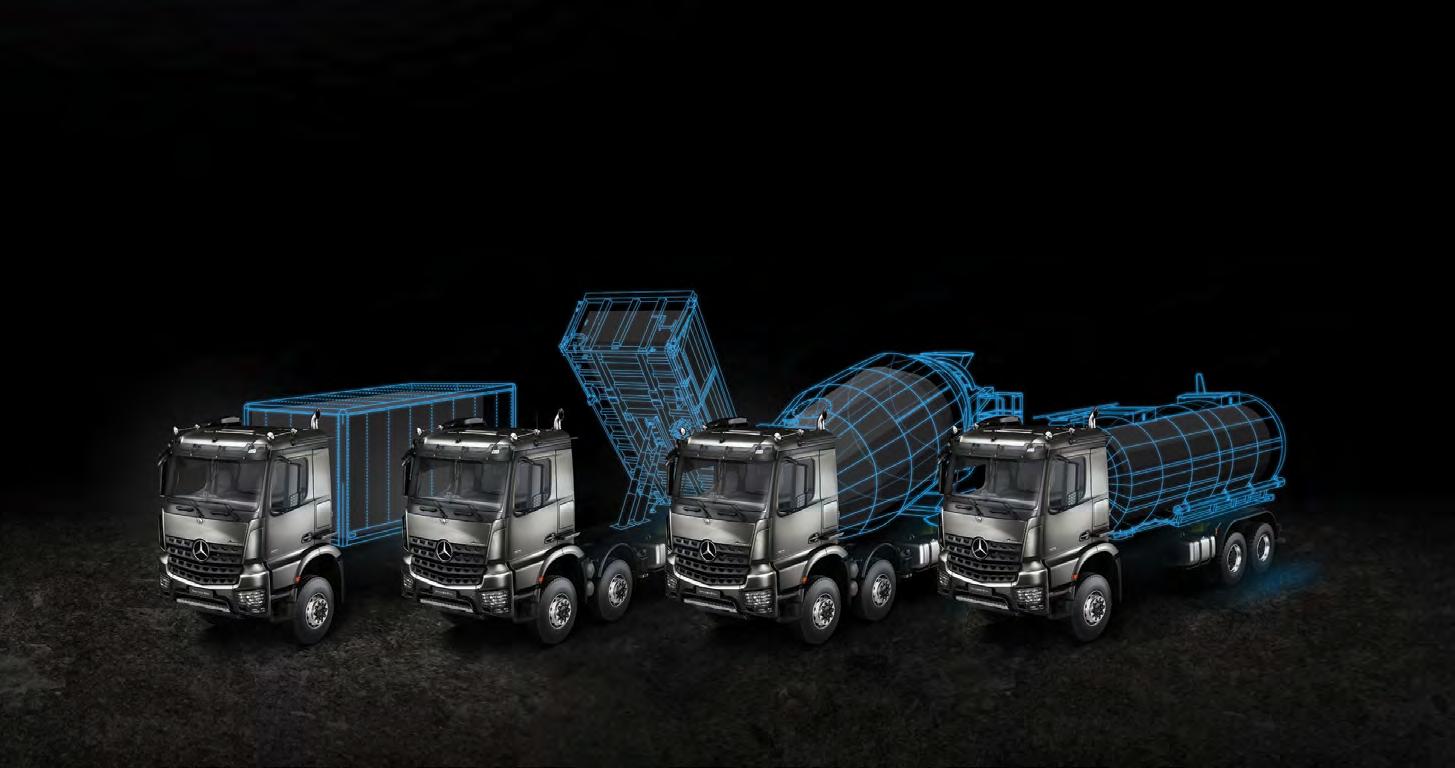
With industry leaders incorporating more sustainable solutions into their operations, sustainability has recently taken a new direction
Writer Relocations has been a prominent player in the international relocation market for more than 65 years, offering end-to-end services in the area of people and asset mobility. Moreover, one of the chosen premium mobility players, Writer Relocations, arranges more than 8,000 relocations annually.

Likewise, Writer Relocations has the vision to make a difference in the lives of the people they serve. In this article, Logistics News ME speaks with Simon Mason, Chief Operating and Chief Revenue Officer of Writer Relocations, where they discuss the fundamentals of sustainability in the region’s logistics industry…
How important do you think sustainability is essential in the logistics industry?
At a time transportation is accountable for one-fifth of all CO2 emissions
worldwide, businesses have come to realise the importance of recyclable and eco-friendly practices to transition towards a clean and green future, and the logistics industry, most notably, mobility, is no exception!
We at Writer Relocations believe that green concepts and climate risk awareness are presently driving forces in business and our personal and community lives. While the environmental impact of COVID-19 has yet to pan out entirely, there has been a noticeable increase in recent years in the propensity to enact green policies.
Sustainable logistics often refers to strategies and procedures that strive to improve the sustainability of supplychain operations spanning from raw material supply through product storage, manufacturing, and distribution.
Regarding CO2 emissions and greenhouse gas output, the transportation industry is only second to the energy
sector. In addition, the industry’s share of CO2 emissions has grown 1.9% yearly since 2000, mostly due to the acceleration of globalisation and the rise in consumer demand.
Renewable energy and efficient systems are increasingly becoming commonplace in global logistics. Companies that reduce their pollution have a better chance of winning contracts, therefore, changing their operations to take these variables into account can help them win bids in logistics tenders. Moreover, it enhances compliance with government regulations and raises brand exposure through consumer involvement.
Are companies take an extra initiative to incorporate sustainability in logistics? In product packaging, an area of concern for the world’s long-term health is the use of packaging in shipping products. The extra boxes, bubble wrap, tissue paper, and additional packaging materials can harm the environment. If the end consumer does not recycle the excess material, it clogs landfills and contributes to a growing problem.
It is worth mentioning that international businesses are creating packaging that is “functional, safe, and ecologically friendly.” The Institute of Packaging Sciences lab will test various product lines for the new packaging that will examine recyclable, biodegradable, and compostable technologies.
In the global supply chain, warehouse sustainability is a big challenge for energy efficiency. However, there are several initiatives warehouses may take to become more sustainable, particularly in terms of energy use. Proper warehouse lighting is a critical component that may dramatically reduce energy use, with many businesses saving 50 to 60 per cent on yearly lighting expenditures. Less energy use is a gain for the environment.
The usage of alternative energy sources is another aspect of energy efficiency. Solar and wind power are increasingly being used by businesses to lessen their dependency on traditional energy sources and create their electricity. Many warehouses may repay the
cost of solar panel installation within the first six months. Wind energy and skylights may bring in natural light and minimise the amount of electric lighting required in warehouses that are not appropriate for solar panels.
As a part of our Sustainability drive, we at Writer Relocations are following the above initiatives.
Are Middle Eastern companies taking an extra initiative towards sustainability in the supply chain?
They are considering the strategic location they’re functioning in along major shipping routes and the availability of resources like world-class air and seaports, efficient and adequate logistics infrastructure, limited government bureaucracy and reasonable charges and cost-effectiveness.
Logistics companies have started embracing technology transformations and customer-centricity via building agile and resilient supply chains. Companies have begun to use data to improve inefficient supply chain processes, like optimising routes with necessary trips for loading and unloading trucks.
With technological adoption, there is growth in new roles traditionally not found in the logistics sector, and they are beginning to emerge with technology adoption. These roles include dataanalysis and data-management roles, software development job roles, and digitalisation and automation.

Where do you see the industry moving forward with embedding sustainability?
Most would know that the logistics industry is deemed to be a conservative industry. Transportation and logistics companies’ biggest challenge is the lack of digital culture and training.
However, I’ve seen that most of the transportation and logistics firms expect to spend their earnings over the coming few years like other sectors of the economy.
Adopting technological innovation in AI, robotics, and the Internet of Things (IoT) will make it easier to facilitate autonomy. Companies working in the logistics industry will be able to prosper in this new economy by taking advantage of their capacity to adopt new technology.
The future of logistics technology and warehousing solutions will significantly rely on rapidly developing technologies like drones or other cutting-edge robotics!
Your take on sustainable initiatives?
Sustainable initiatives in the mobility industry are still nascent, and it will take a few years for the industry to align itself entirely to the requirements. While technology is taking its course, the industry needs to do more to create a more significant impact.

We admire the regional governments’ visions, and there is a massive potential for stakeholders across the industry to collaborate and work closely on innovative solutions to bring about the desired change.
To sum up, minor development will only make a better and more sustainable future for future generations!
From April 24 2023, Etihad Cargo will offer over 600 tons of cargo capacity out of the US per week, along with 28 widebody passenger flights and two freighter flights weekly
With the addition of an extra three weekly flights to John F. Kennedy International Airport (JFK) beginning on April 24 2023, Etihad Cargo, the cargo and logistics division of Etihad Aviation Group, will further strengthen its commitment to the US market. The new flights will increase Etihad Cargo’s weekly cargo capacity from the US to nearly 600 tonnes.
Both the Airbus A350 and the Boeing 787-9 Dreamliner, two of the world’s most fuel-efficient aeroplanes that emit much less CO2 than dual aisle aircraft from earlier generations, will be used for the flights.
“The introduction of double-daily direct flights from our Abu Dhabi hub to New York comes in response to increased demand from customers, and Etihad Cargo will continue to explore opportunities to expand its global net-

work and introduce the required capacity,” said Martin Drew, Senior Vice President Global Sales & Cargo, Etihad Aviation Group.
“The addition of more flights per day to New York combined with Etihad Cargo’s services to other key US destinations and comprehensive road feeder service network will enable Etihad Cargo to fully support its customers in the transportation of their cargo to online and offline locations throughout this key market.”
On average, Etihad Cargo runs 11 flights per week to John F. Kennedy International Airport; starting on April 24, 2023, that number will rise to 14. The company also has daily flights to Chicago O’Hare International Airport and Washington’s Dulles International Airport. Additionally, with an offline network, Etihad Cargo runs two weekly Boeing 777 freighter flights from Dubai to Chicago through Amsterdam.
With a complete line-up of AWD and PWD versions and the the 16-speed HI-TRONIX automated gearbox, the IVECO T-WAY features a host of functionalities such as Rocking Mode, Off-road Mode, Creeping Mode and 4 reverse gears to tackle with ease the toughest off-road conditions. The new architecture of the EBS system, combined with disc brakes on all wheels, greatly improves the vehicle’s performance and the driver’s safety in the most demanding applications.
The new IVECO S-WAY, with a completely redesigned and reinforced cab, offers a wide choice of Euro III/V diesel engines, a delivering class-leading power from 360 HP to 560 HP Euro III / 570 HP Euro V and superior fuel-saving devices, such as anti-idling feature, Ecoswitch, Ecoroll and Smart Alternator. 12-speed HI-TRONIX automated transmission with the most advanced technology in its category, electronic clutch and best-in-class torque-to-weight ratio.





